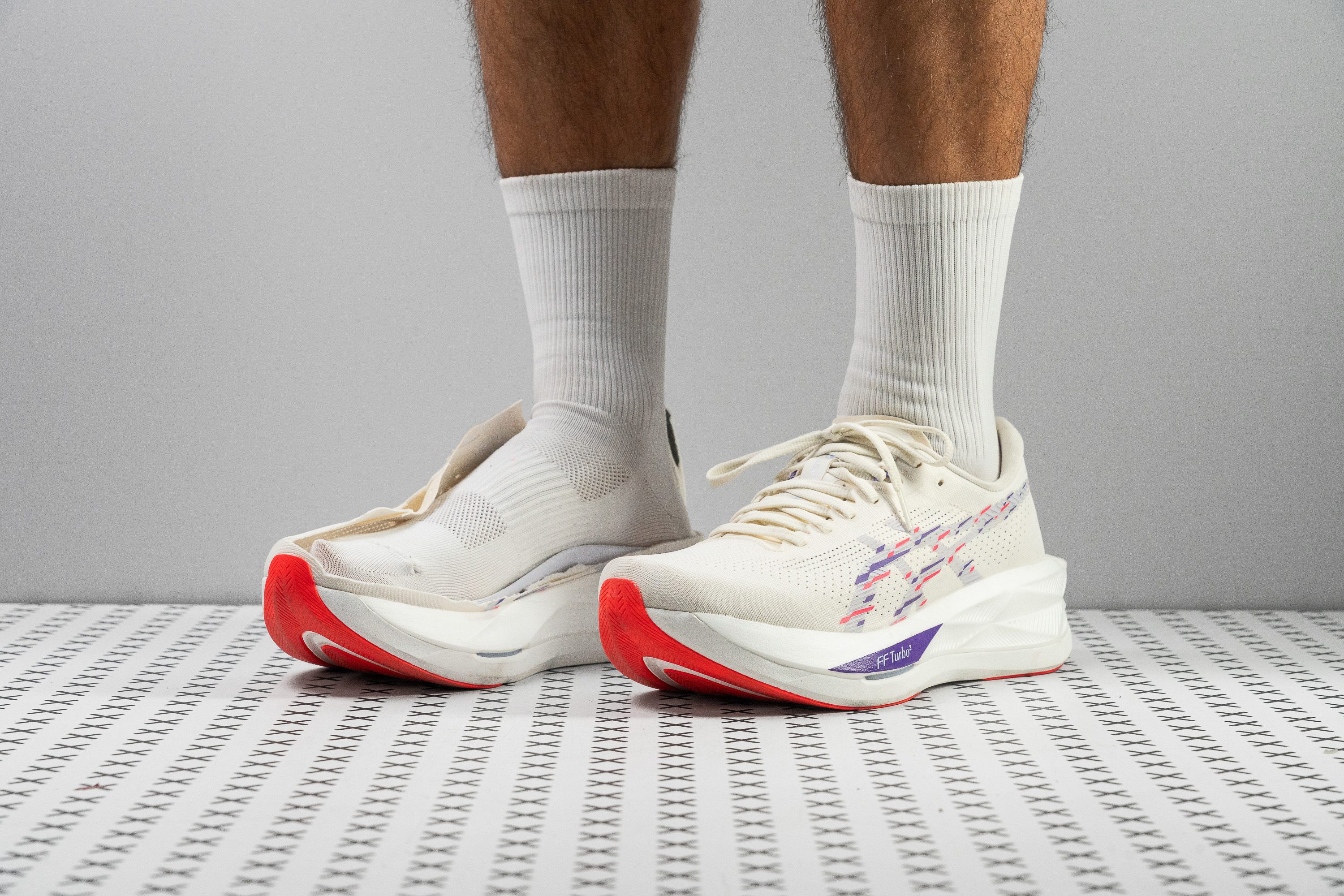Our verdict
Pros
- Exceptionally cushioned
- Strong energy return
- Perfect for long runs
- Outstanding grip
- Top-tier breathability
- Fair price
- More agile than most competitors
- Secure lockdown
Cons
- Not for wide feet
- Stiff build limits versatility
- Could be a bit softer
- Misleading midsole branding
Audience verdict
Comparison
The most similar running shoes compared
+ + Add a shoe | |||||
|---|---|---|---|---|---|
| Audience score | 84 Good! | 92 Superb! | 89 Great! | 88 Great! | |
| Price | £170 | £140 | £150 | £210 | |
| Pace | Daily runningTempo | Daily running | Daily running | CompetitionTempo | |
| Shock absorption | High | High | High | High | |
| Energy return | High | High | Moderate | High | |
| Traction | High | High | High | High | |
| Arch support | Neutral | Neutral | Neutral | Neutral | |
| Weight lab Weight brand | 9 oz / 255g 9 oz / 255g | 8.7 oz / 248g 8.6 oz / 245g | 9.9 oz / 282g 10 oz / 283g | 7.7 oz / 218g 7.9 oz / 224g | |
| Lightweight | ✗ | ✓ | ✗ | ✓ | |
| Drop lab Drop brand | 9.0 mm 8.0 mm | 10.3 mm 8.0 mm | 8.7 mm 5.0 mm | 9.9 mm 8.0 mm | |
| Strike pattern | HeelMid/forefoot | Heel | HeelMid/forefoot | HeelMid/forefoot | |
| Size | - | Slightly large | True to size | True to size | |
| Midsole softness | Soft | Balanced | Soft | Soft | |
| Difference in midsole softness in cold | Small | Small | Normal | Small | |
| Toebox durability | Bad | Bad | Decent | Bad | |
| Heel padding durability | Good | Decent | Good | Good | |
| Outsole durability | Decent | Decent | Good | Good | |
| Breathability | Breathable | Moderate | Breathable | Moderate | |
| Width / fit | Narrow | Narrow | Medium | Medium | |
| Toebox width | Narrow | Narrow | Narrow | Medium | |
| Stiffness | Stiff | Moderate | Stiff | Stiff | |
| Torsional rigidity | Stiff | Stiff | Stiff | Stiff | |
| Heel counter stiffness | Flexible | Flexible | Stiff | Moderate | |
| Rocker | ✓ | ✗ | ✗ | ✓ | |
| Heel lab Heel brand | 45.4 mm 46.0 mm | 42.2 mm 40.0 mm | 39.3 mm 39.0 mm | 45.1 mm 45.0 mm | |
| Forefoot lab Forefoot brand | 36.4 mm 38.0 mm | 31.9 mm 32.0 mm | 30.6 mm 34.0 mm | 35.2 mm 37.0 mm | |
| Widths available | Normal | Normal | NormalWide | Normal | |
| Orthotic friendly | ✓ | ✓ | ✓ | ✓ | |
| Season | SummerAll seasons | All seasons | SummerAll seasons | All seasons | |
| Removable insole | ✓ | ✓ | ✓ | ✓ | |
| Ranking | #244 Bottom 36% | #13 Top 4% | #118 Top 31% | #123 Top 33% | |
| Popularity | #151 Top 40% | #95 Top 25% | #94 Top 25% | #31 Top 9% |
Who should buy
We think the ASICS Sonicblast is a great match for:
- Runners looking for a plated super trainer without paying +200 dollars.
- Marathoners wanting a shoe that’s perfect for long runs and extended intervals while keeping their legs fresh.
- Fans of the Superblast series who wanted a more compact and agile shoe with the same stack height.
- Runners with narrow feet who need a secure fit in a performance-oriented tempo shoe.
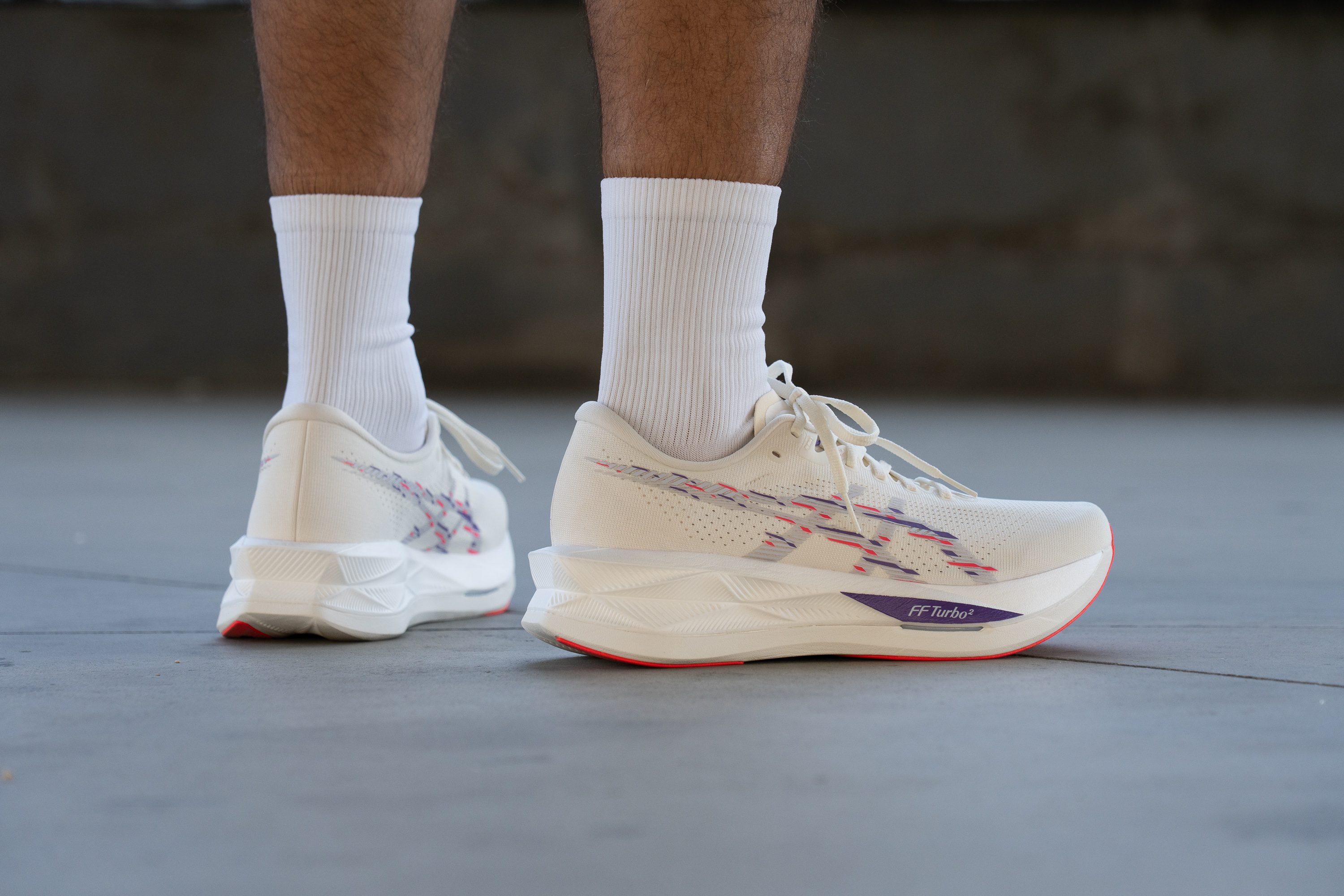
Who should NOT buy
We think the ASICS Sonicblast isn’t the best choice for runners with wide feet. Its narrow, tapered toebox feels restrictive, especially during long runs, and we found in our lab that it limits toe movement considerably. If that's a problem for you, check alternatives like the ASICS Magic Speed 4 or the Saucony Endorphin Speed 5.
Additionally, we believe that runners who prefer a plateless experience won’t be fully satisfied here. In this case, we think shoes like the ASICS Megablast or the Adidas Adizero EVO SL are better options that also feature higher energy return.
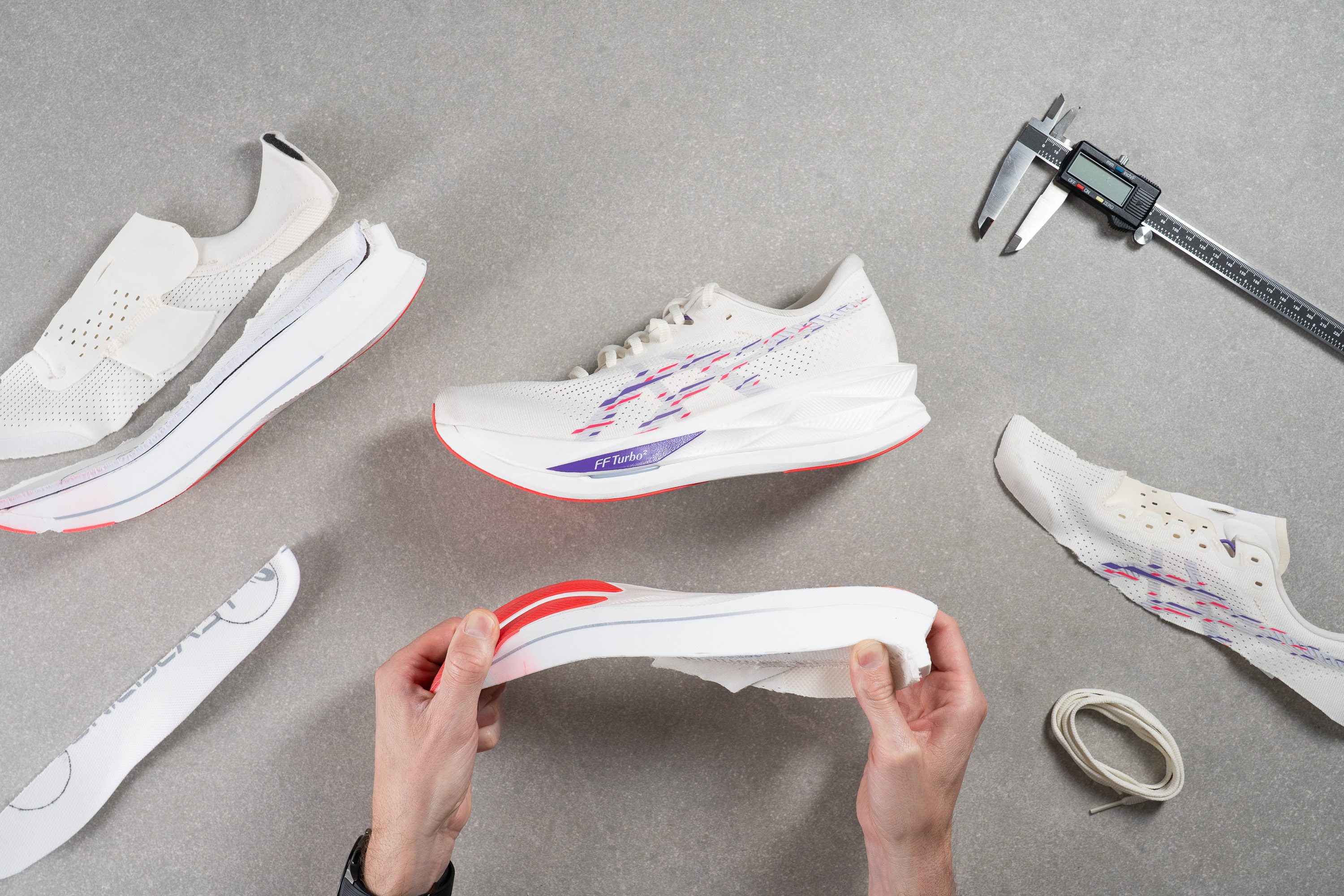
Cushioning
Shock absorption
One of the first things that stands out about the Sonicblast is its towering stack height. With so much foam, we expected exceptional shock absorption, and after testing, it fully delivered.
Scoring 149 SA in the heel and 133 SA in the forefoot, this shoe is a dream come true for runners who crave maximum underfoot cushioning.
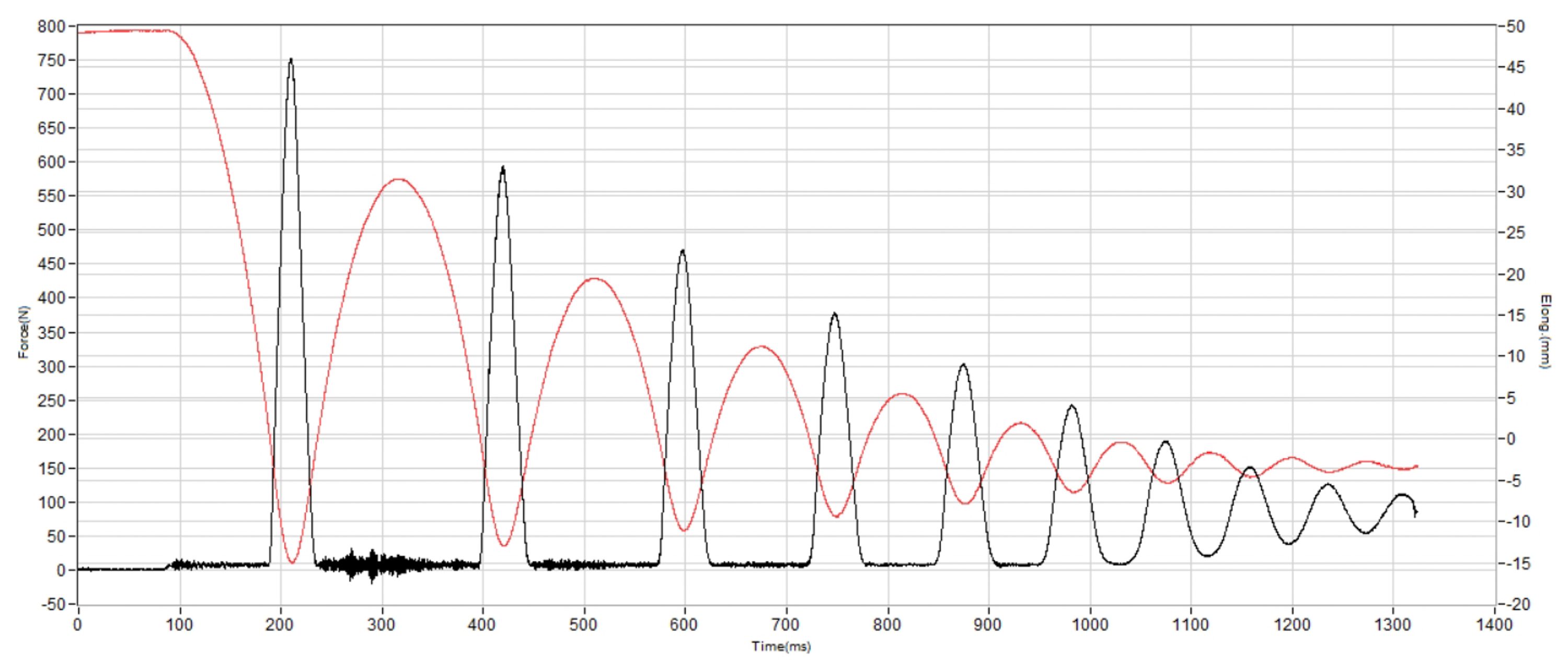
| Sonicblast | 149 SA |
| Average | 130 SA |
Energy return
We also used our ASTM F1976 machine to test energy return, a key factor for any super trainer meant for tempo workouts, or even long runs. We wanted to see how efficiently the foam rebounds.
After testing, we discovered an impressive result of 68.9%, bringing it close to super shoe territory. However, it doesn’t quite reach the 70% mark, and that makes sense. Unlike the Megablast, this model combines two foams: the ultra-responsive FF Turbo² above the plate and the less bouncy FF Blast Max beneath it.
| Sonicblast | 68.9% |
| Average | 58.6% |
Heel stack
We discovered that the Sonicblast joins ASICS’s Blast family as its tallest model yet, with a sky-high 45.4 mm stack height that would’ve seemed unbelievable just a few years ago.
But in 2025, this foam-packed trend is exactly what runners are asking for, and ASICS has delivered for those craving maximum cushioning under the heel.
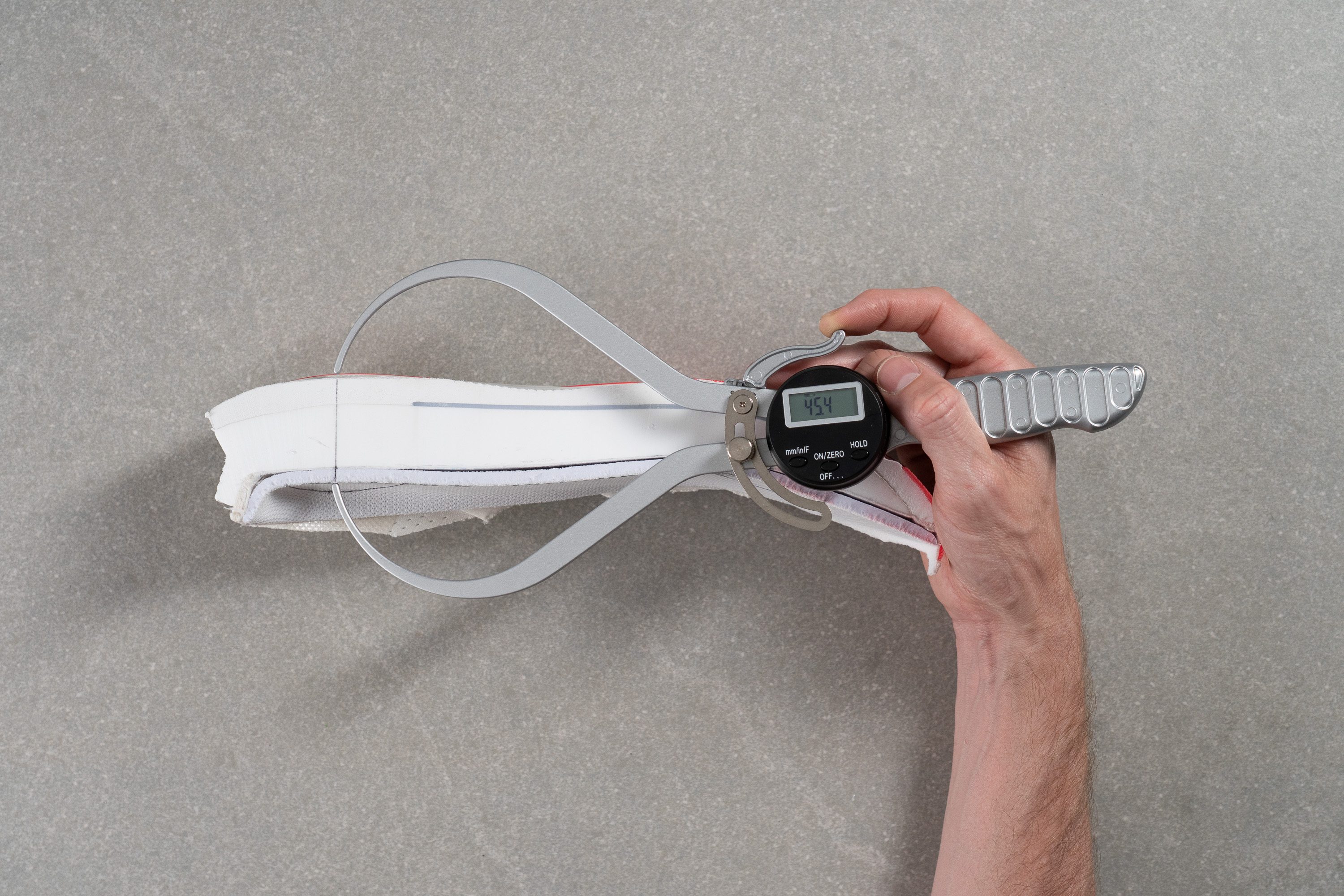
| Sonicblast | 45.4 mm |
| Average | 34.8 mm |
Forefoot stack
The forefoot stack is also impressively high, perfect for runners who want total protection from the ground and couldn’t care less about a natural feel.
At 36.4 mm, it’s nearly 3 mm taller than the Nike Pegasus 41’s... heel!
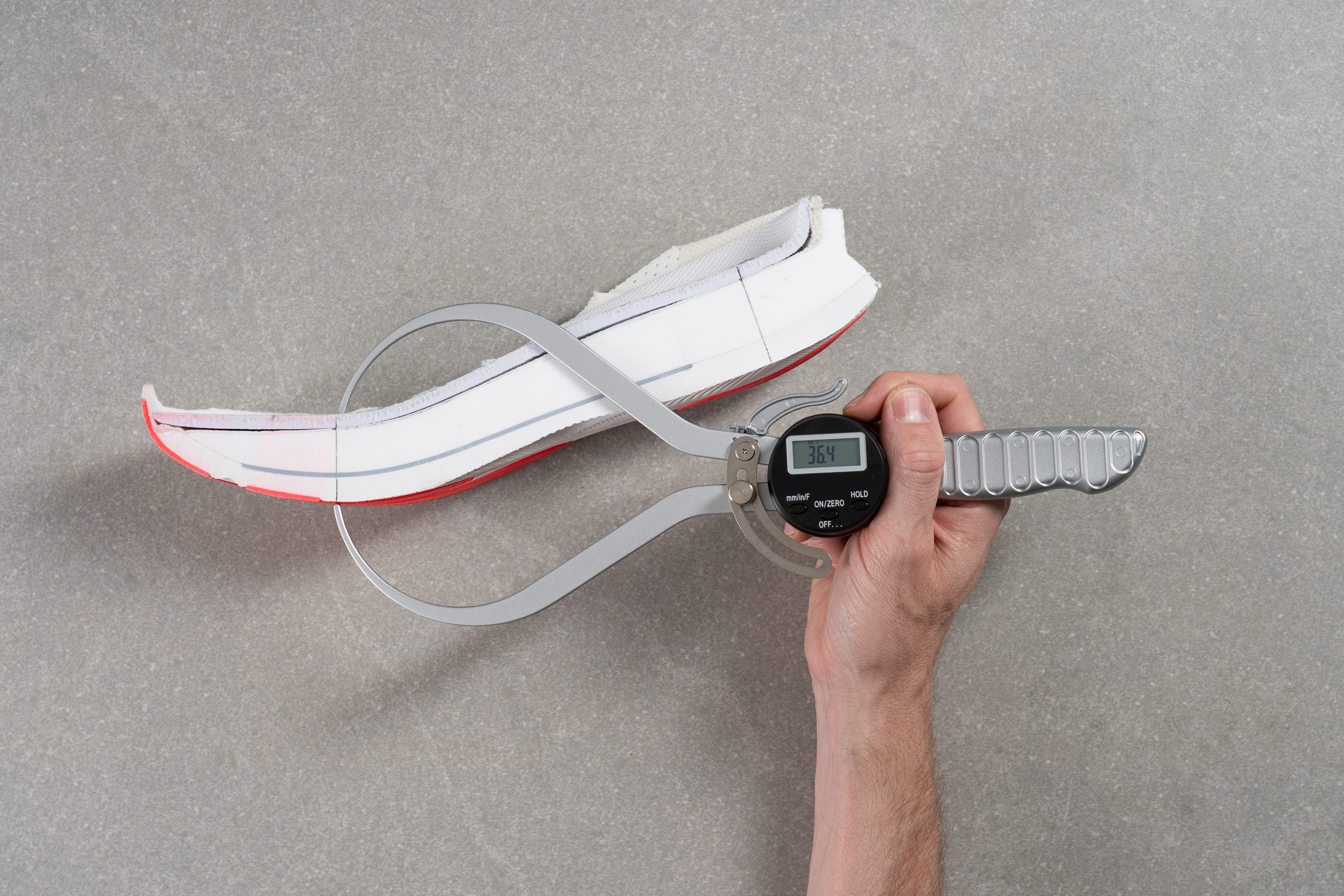
| Sonicblast | 36.4 mm |
| Average | 26.2 mm |
Drop
ASICS lists an 8 mm drop, and our measurement came in just 1 mm higher at 9 mm. This means the ride feels exactly as expected, suitable for all types of footstrikes.
This photo clearly shows how ASICS structured the midsole, placing FF Blast Max beneath the plate for added durability while shielding the top layer of FF Turbo².
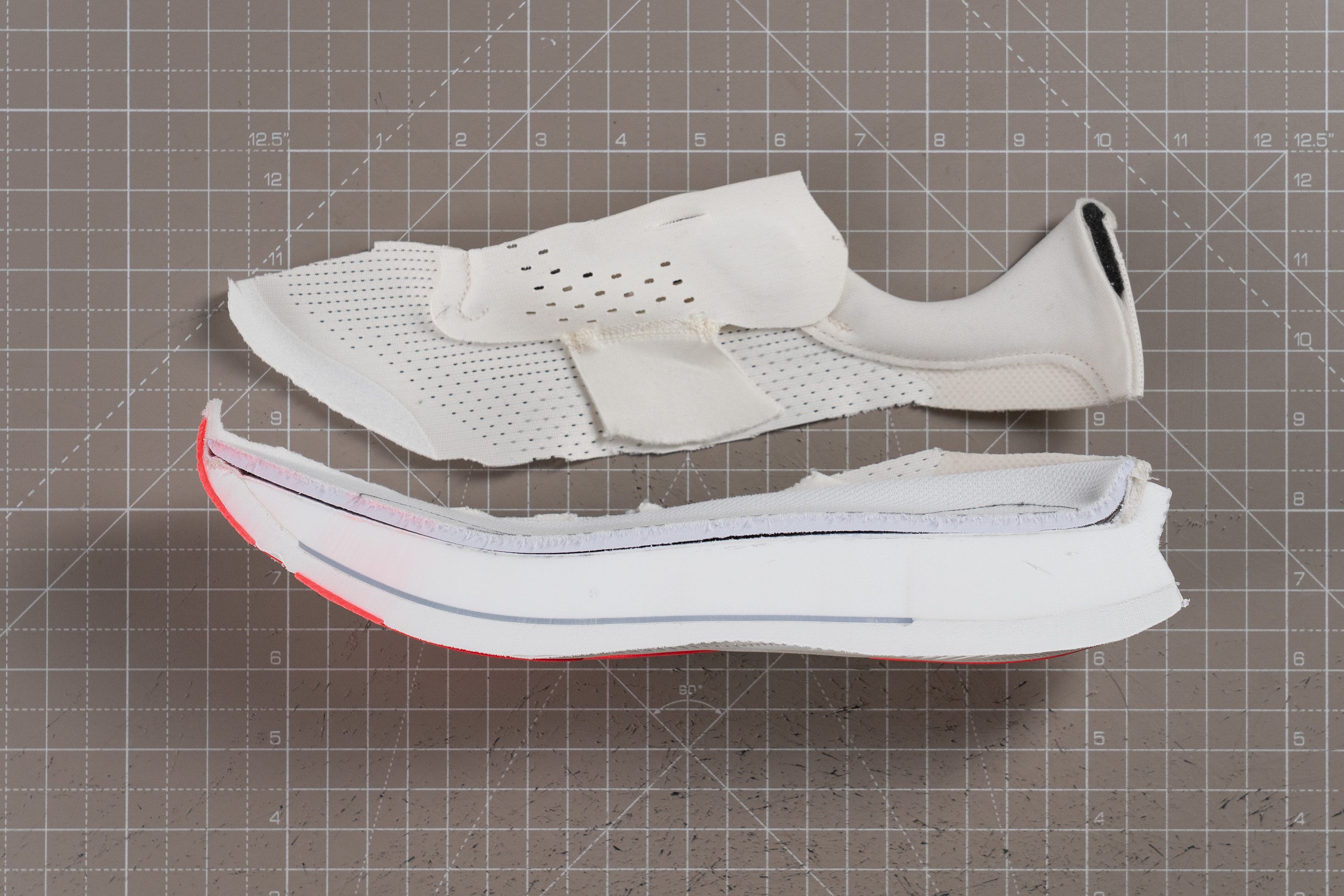
| Sonicblast | 9.0 mm |
| Average | 8.6 mm |
Midsole softness
UpdatedThe main foam in the first-generation Sonicblast is the outstanding FF Turbo². It's an A-TPU compound that combines explosive energy return, strong durability, and low weight, outperforming PEBA in several areas.
The ride isn’t super soft like some expect in super trainers, and we measured 37.5 AC on our Asker C durometer. During our runs, we felt a slightly firm but responsive feel underfoot.
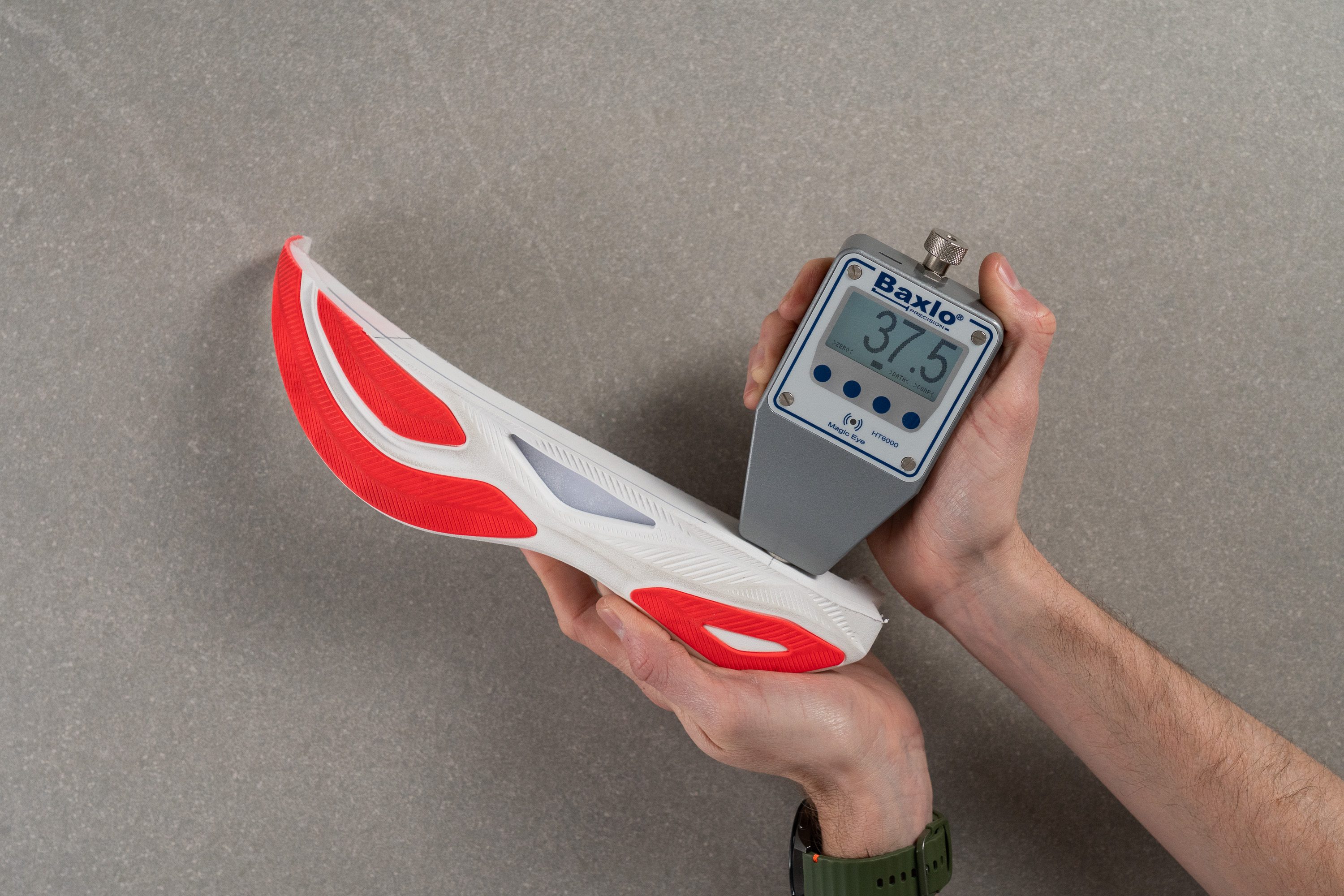
| Sonicblast | 37.5 AC |
| Average | 36.4 AC |
Secondary foam
UpdatedASICS is one of the top running shoe brands, with standout models like the Metaspeed Ray. However, there’s one thing we don’t love (and we’ve mentioned multiple times before): they only list the top foam in the midsole. This can easily confuse runners who think they’re getting a full FF Turbo² setup, when in reality, it’s a mix of FF Turbo² and FF Blast Max.
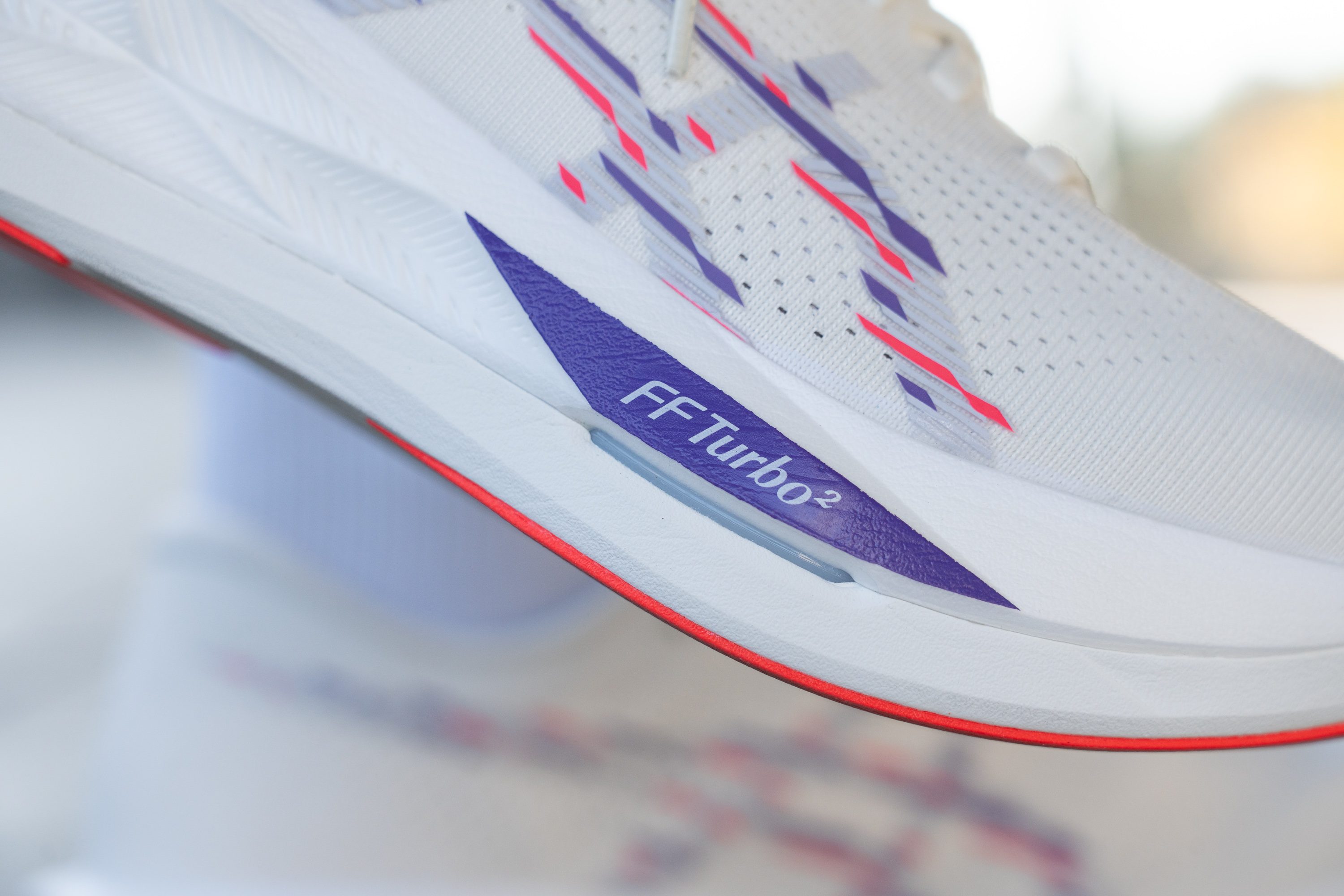
To be fair, FF Blast Max isn’t a bad foam at all, and it makes sense here given the Sonicblast’s lower price compared to the Megablast. Still, we wish ASICS were clearer about what’s actually inside, as we’ve seen the same issue with the Metafuji Trail and Magic Speed 4.
The lower layer feels similar in terms of softness, measuring 39.9 AC, but offers slightly less energy return. However, we already expected as we have already tested here the Novablast 5, which uses a single layer of FF Blast Max.
| Sonicblast | 39.9 AC |
| Average | 39.1 AC |
Rocker
The Sonicblast features a highly aggressive forefoot rocker that drives you forward and helps counter its towering stack height.
In contrast, the heel curvature is surprisingly mild—a detail that caught us off guard, especially considering the Superblast 2’s much deeper bevel despite having nearly identical stack height.
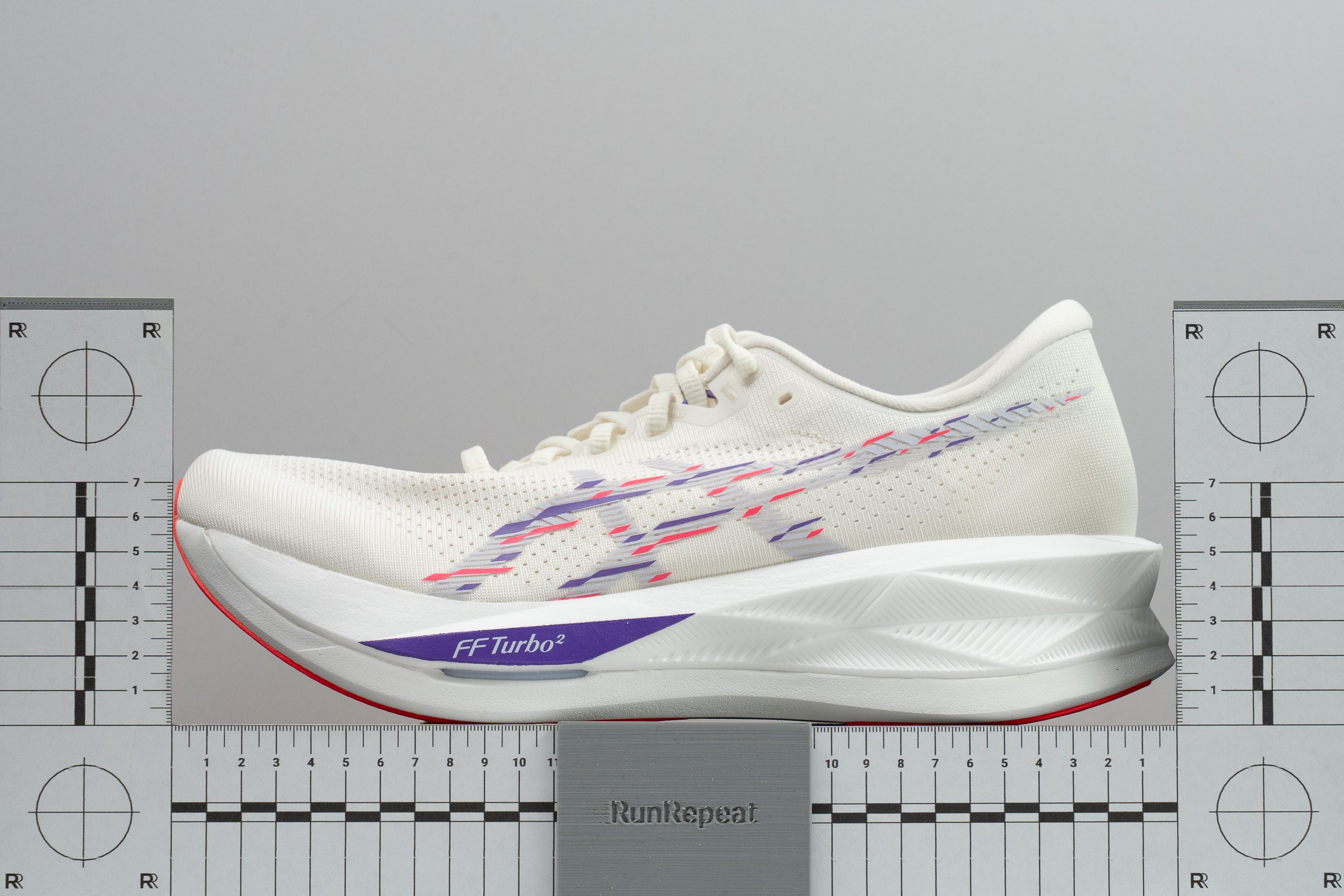
Plate
As you can see in our video, the plate extends across roughly three-quarters of the shoe instead of running full-length. It's funny because the Sonicblast feels like a remix of several ASICS models, borrowing the plate's length directly from the Metaspeed Ray and the midsole design from the Superblast 2.
The plate is made of Pebax instead of carbon fibre, giving it a more flexible feel. And ASICS even gave it a fun name: Astroplate. Why ASICS decided to name only this plate while leaving others unnamed remains a mystery to us.
Size and fit
Size
Width / Fit
The Sonicblast doesn’t provide a roomy fit, more like the opposite. That was our impression during testing, and our lab results confirmed it.
Using our gel mould method, we measured the interior and found a width of 92.8 mm, clearly narrower than average.
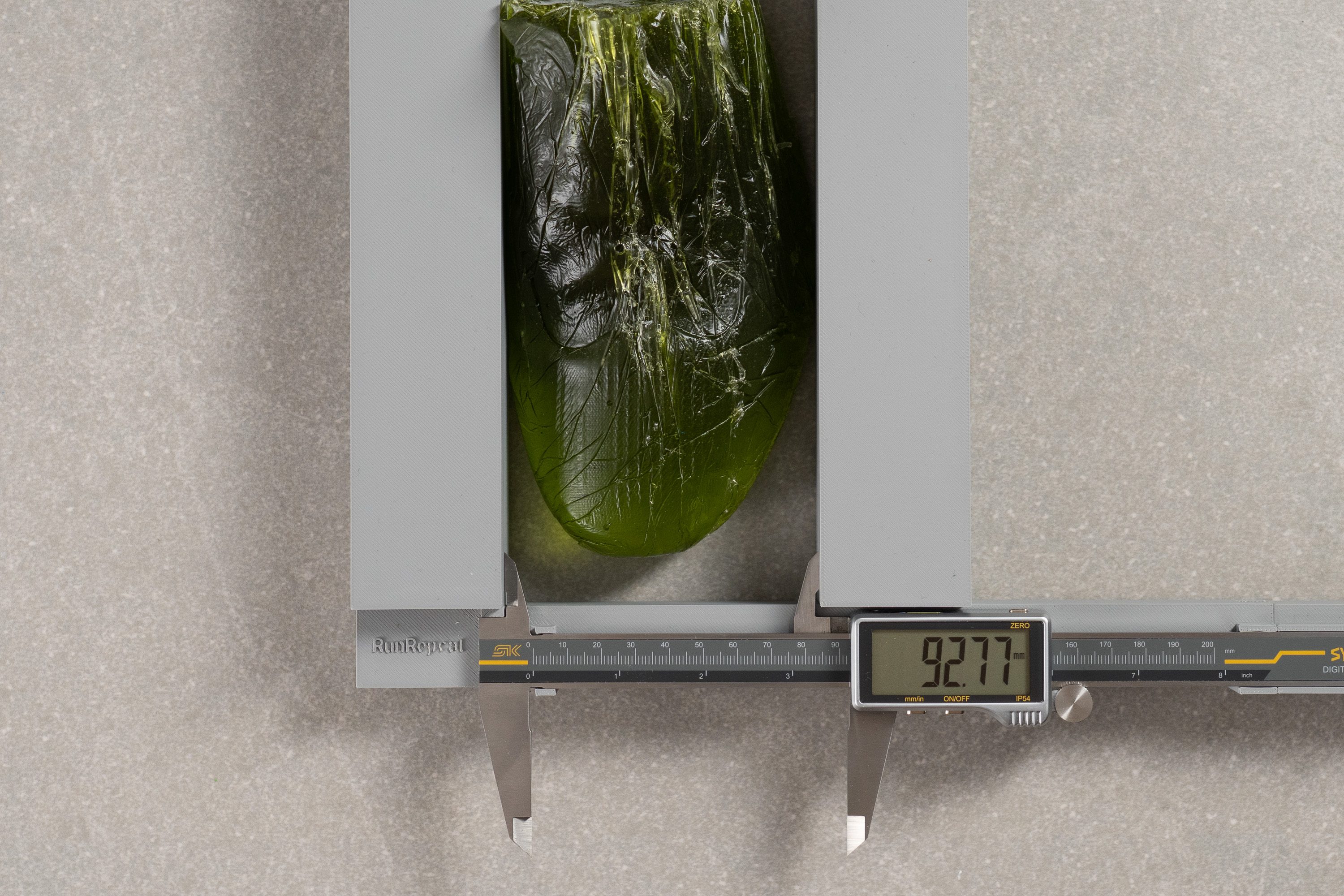
| Sonicblast | 92.8 mm |
| Average | 95.1 mm |
Toebox width
The snug fit continues into the toebox, becoming even more noticeable at 70.1 mm.
Runners who prefer a tight, performance-oriented feel will appreciate the Sonicblast, but others may find it too tapered, especially during long runs.
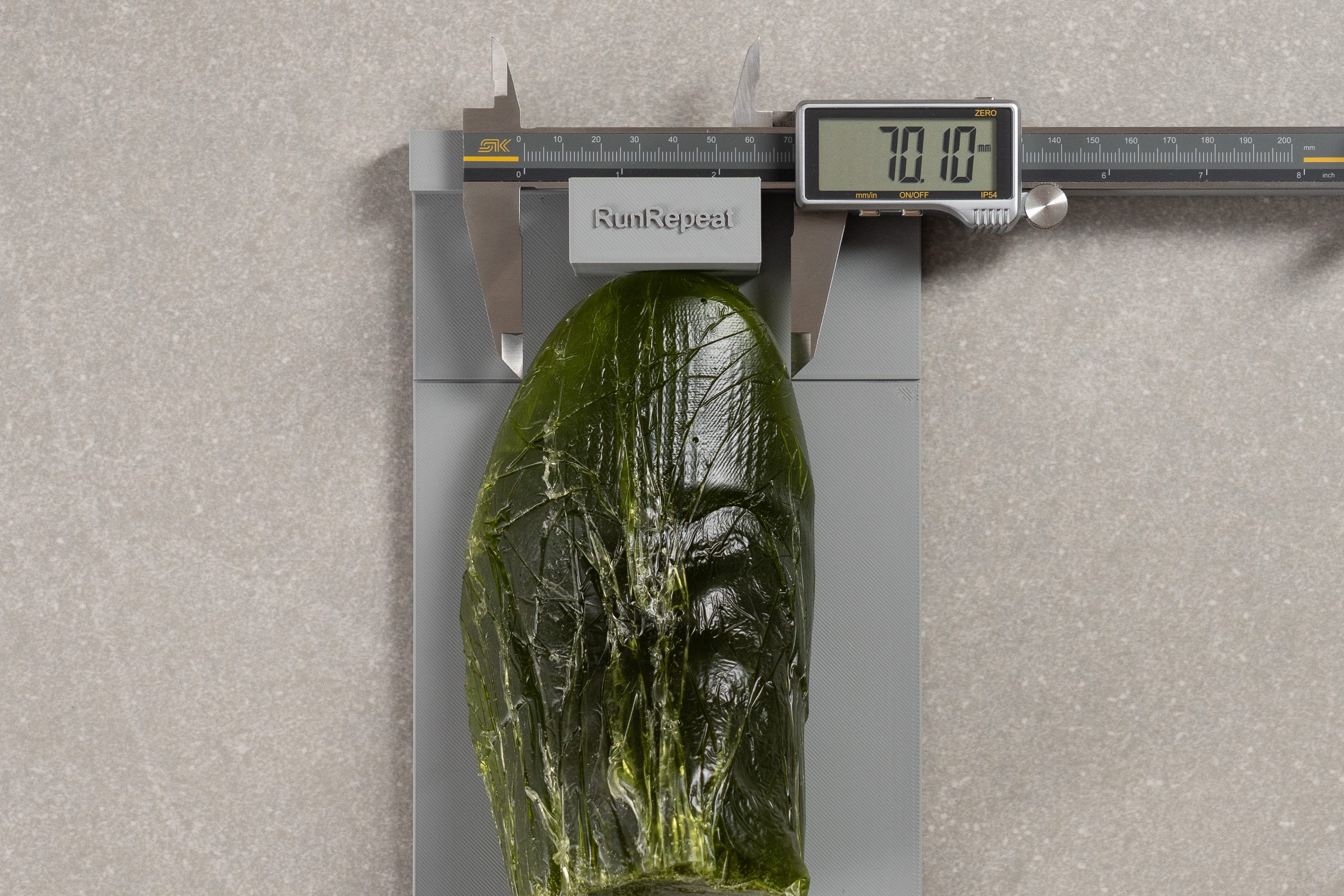
| Sonicblast | 70.1 mm |
| Average | 73.3 mm |
Toebox height
We discovered that the toebox height also feels slightly lower than in other ASICS models, and our calliper confirmed it at just 25.4 mm.
This low-profile design provides a secure fit, though runners with high-volume feet should probably skip it.
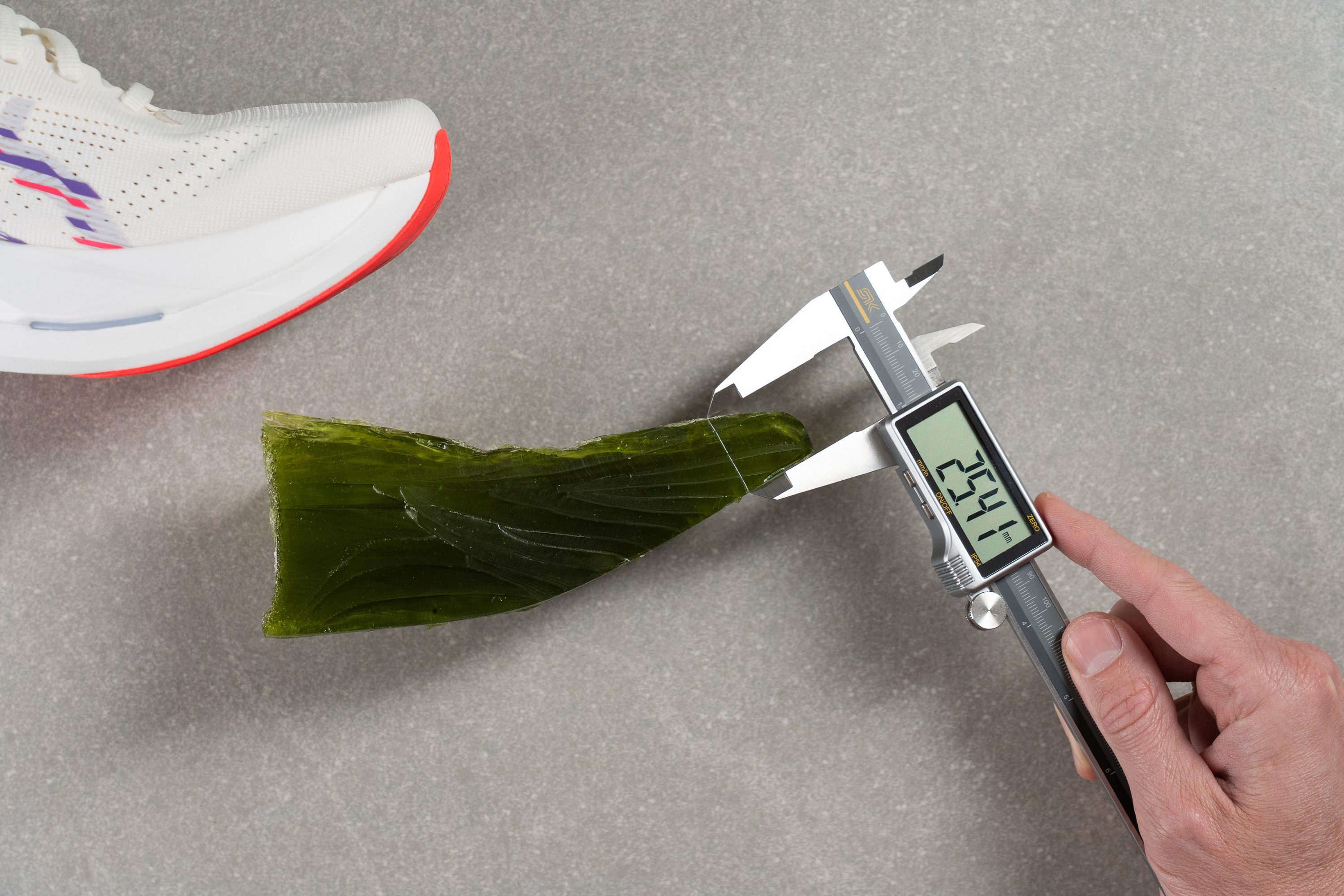
| Sonicblast | 25.4 mm |
| Average | 27.0 mm |
Traction / Grip
Traction test
ASICS has struck gold with its ASICSGRIP compound. Their shoes using only this rubber consistently rank among the highest in our traction test and earn praise from nearly everyone who tries them.
In the Sonicblast, it performed exceptionally well, scoring 0.79 in our lab. This super-grippy rubber puts the shoe far ahead of most competitors from other brands, delivering excellent traction whether it’s sunny, wet, or even lightly snowing.
| Sonicblast | 0.79 |
| Average | 0.49 |
Outsole design
The Sonicblast’s outsole features an asymmetric, eye-catching layout that provides more rubber coverage than other ASICS super trainers.
A midfoot cutout exposes the Astroplate, adding visual flair and saving weight but also has a slight risk of trapping small rocks. The forefoot, meanwhile, features generous rubber placement for strong grip and durability.
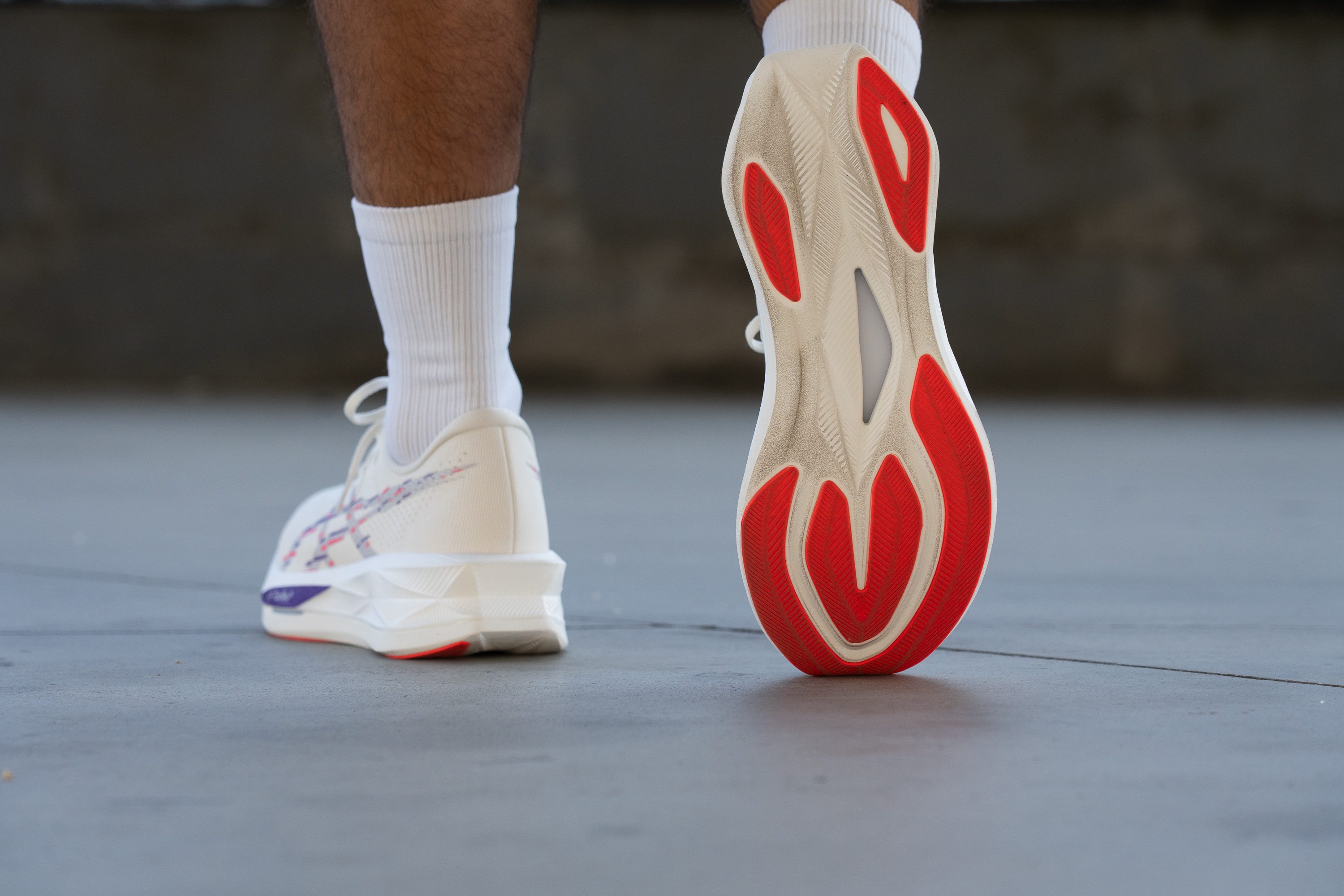
Flexibility / Stiffness
If you’re looking for a flexible running shoe, this one is the exact opposite. It’s extremely rigid despite lacking a carbon-fibre plate, reaching 24.4N in our 30-degree bend test.
Such a high stiffness comes mostly from its towering stack height, although the outsole design and Pebax plate play a role too.
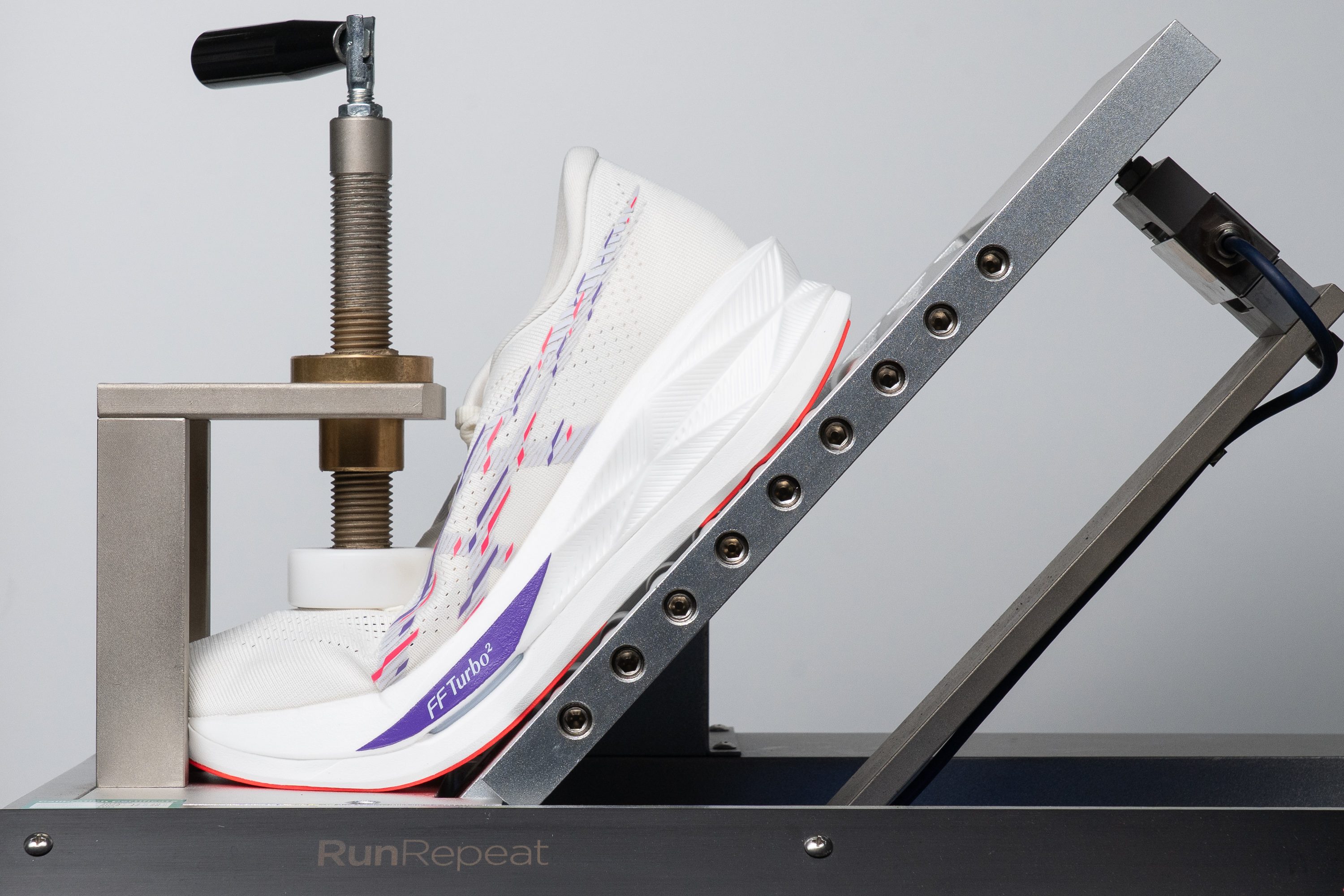
| Sonicblast | 24.4N |
| Average | 15.3N |
Weight
The weight of the Sonicblast is quite an interesting topic. On one hand, at 9.0 oz or 255g, it’s impressively lightweight for such a high-cushioned super trainer. But on the other, ASICS has recently released some ultra-lightweight models that make this one look slightly heavier in comparison.
Still, we think it’s a very reasonable weight overall. If ASICS wanted to make it lighter, they easily could—but that would likely reduce durability, and it might overlap with the Megablast too, which doesn't make sense for them.
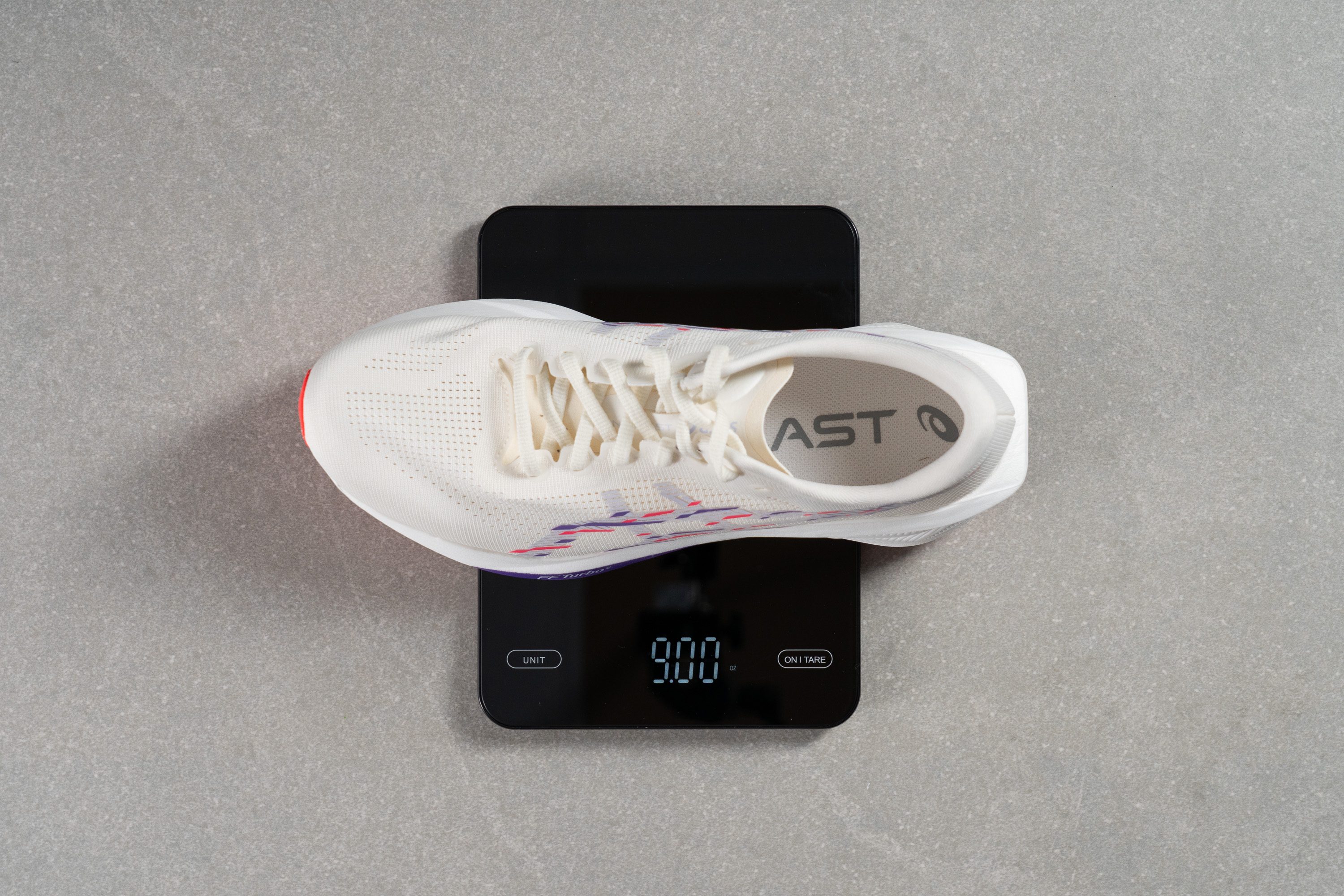
| Sonicblast | 9.0 oz (255g) |
| Average | 9.3 oz (264g) |
Breathability
When we purchased the Sonicblast, we unboxed it and immediately thought: this shoe is going to score a 5/5 for breathability! The upper is covered with ventilation holes, and that showed clearly in our smoke test.
We also measured the upper density and discovered that ASICS did something unusual. Instead of keeping the forefoot thin and the rest thicker, the Sonicblast remains consistently thin across the entire upper, greatly boosting ventilation.
Under the microscope, those tiny perforations are easy to spot, allowing hot air to escape efficiently.
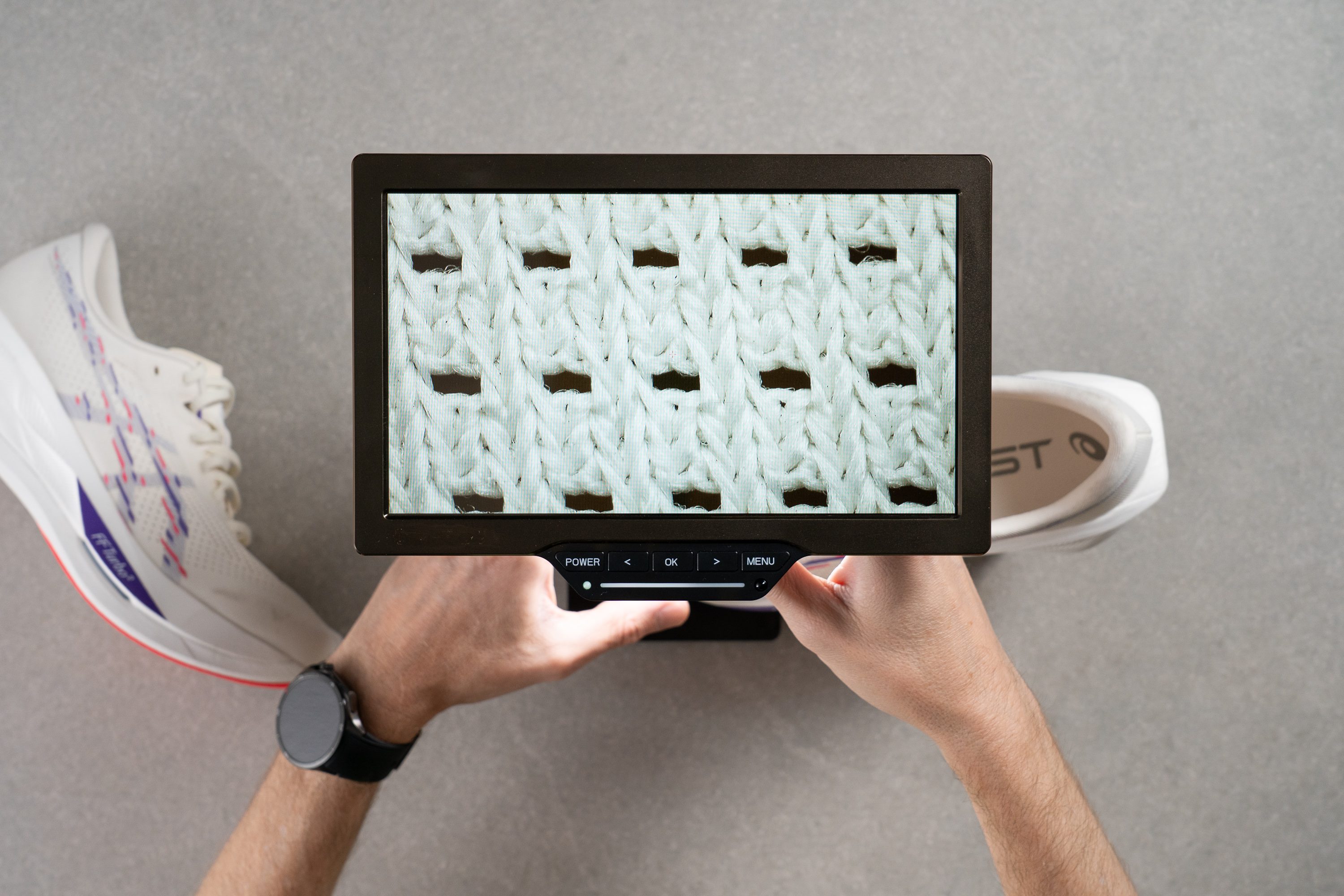
While the material itself is not premium at all and feels like a standard engineered mesh, it performs exceptionally well for breathability.
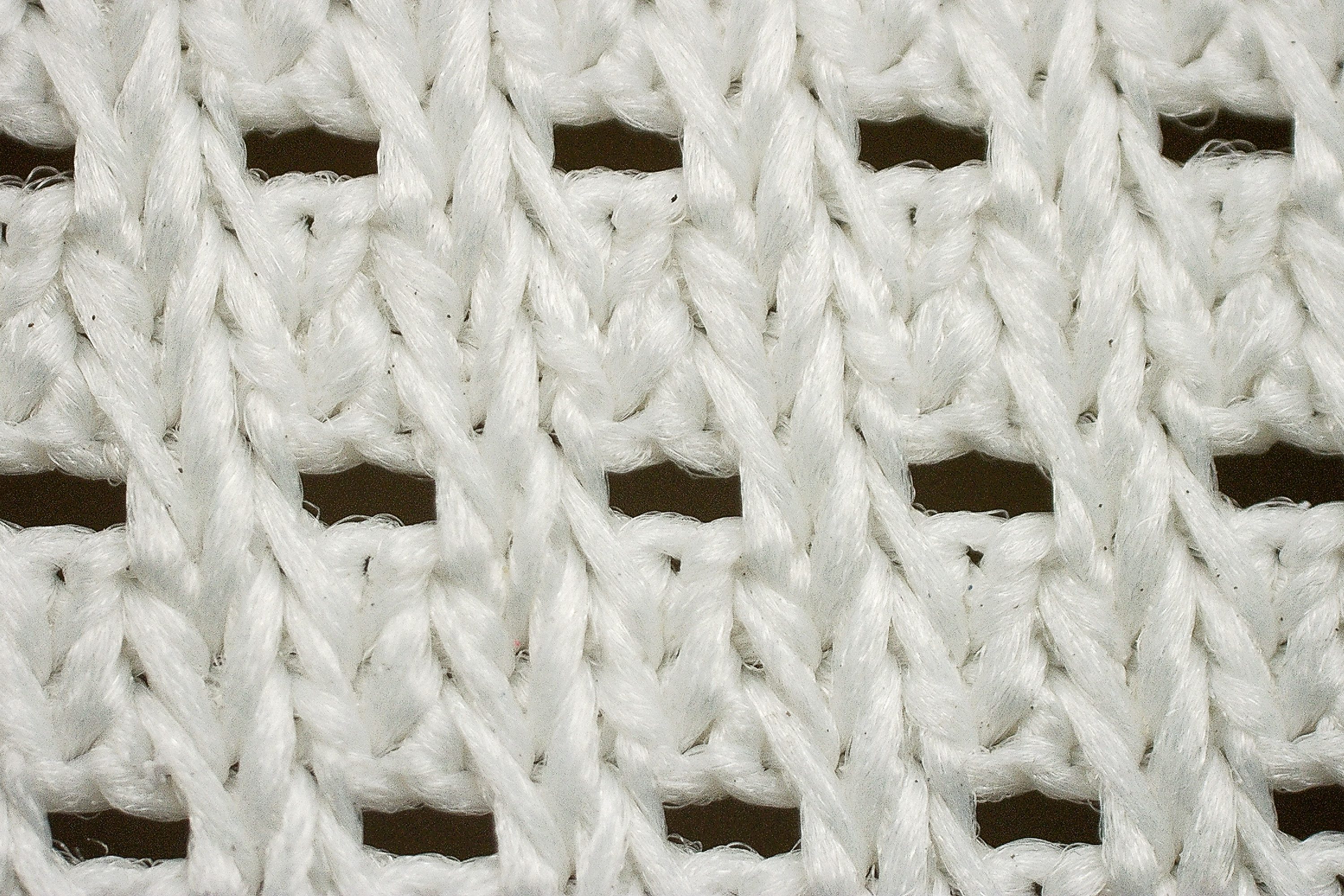
Even the tongue delivers excellent airflow, making this shoe ideal for runners who really need 360-degree ventilation. And the heel area adds a touch of comfort with its large, plush foam padding.
| Sonicblast | 5 |
| Average | 3.7 |
Stability
Lateral stability test
Stability in running shoes can be achieved in several ways. For the Sonicblast, ASICS used a different approach than in the Superblast series, where stability comes from an extra-wide midsole.
Here, the firmer foam and Pebax plate handle the job, creating a supportive feel. However, the sky-high stack height limits stability, so we only recommend this plated trainer for neutral runners rather than those who need extra support.
Torsional rigidity
With such an enormous amount of foam underfoot, there’s absolutely no sense of flexibility while running. We gave it a well-deserved 5/5 score for torsional rigidity.
| Sonicblast | 5 |
| Average | 3.5 |
Heel counter stiffness
The heel counter prioritises comfort over structure, offering minimal support but no irritation or pressure. After our manual assessment, we rated it at 2/5.
| Sonicblast | 2 |
| Average | 2.9 |
Midsole width - forefoot
We already talked about the compact shape of the midsole, especially around the midfoot and forefoot. As shown in our photo, it's clear that this shoe aims for a more dynamic, streamlined feel rather than the bulky, box-like look of many super trainers.
We measured 115.2 mm in the forefoot. That's right around the average and comparable to daily trainers with much lower stacks.
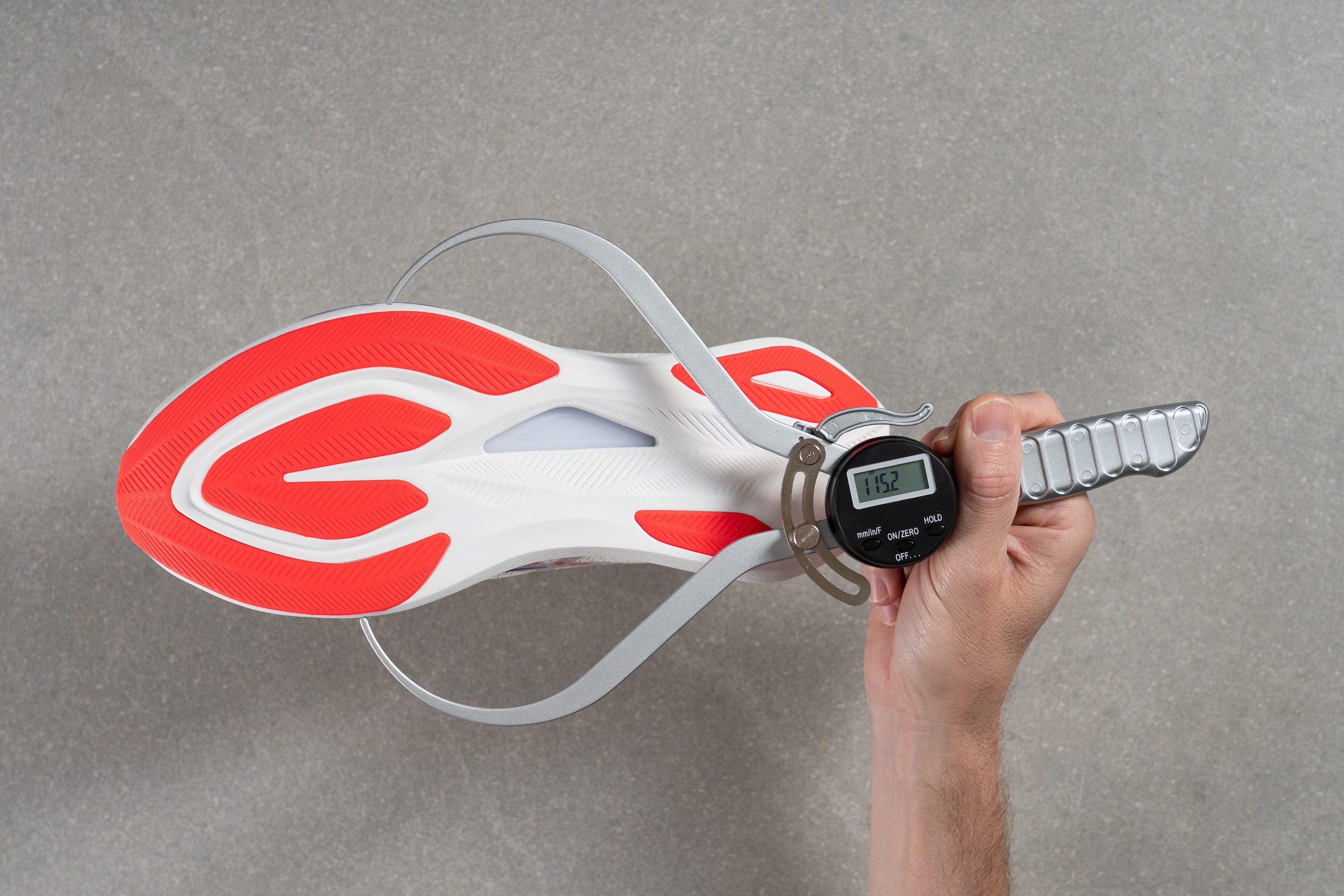
| Sonicblast | 115.2 mm |
| Average | 114.4 mm |
Midsole width - heel
The heel measures 94.1 mm, slightly wider than usual but still modest given the towering 36.4 mm height. It’s likely the minimum width ASICS found viable, because otherwise, this shoe would suit only runners with flawless technique.
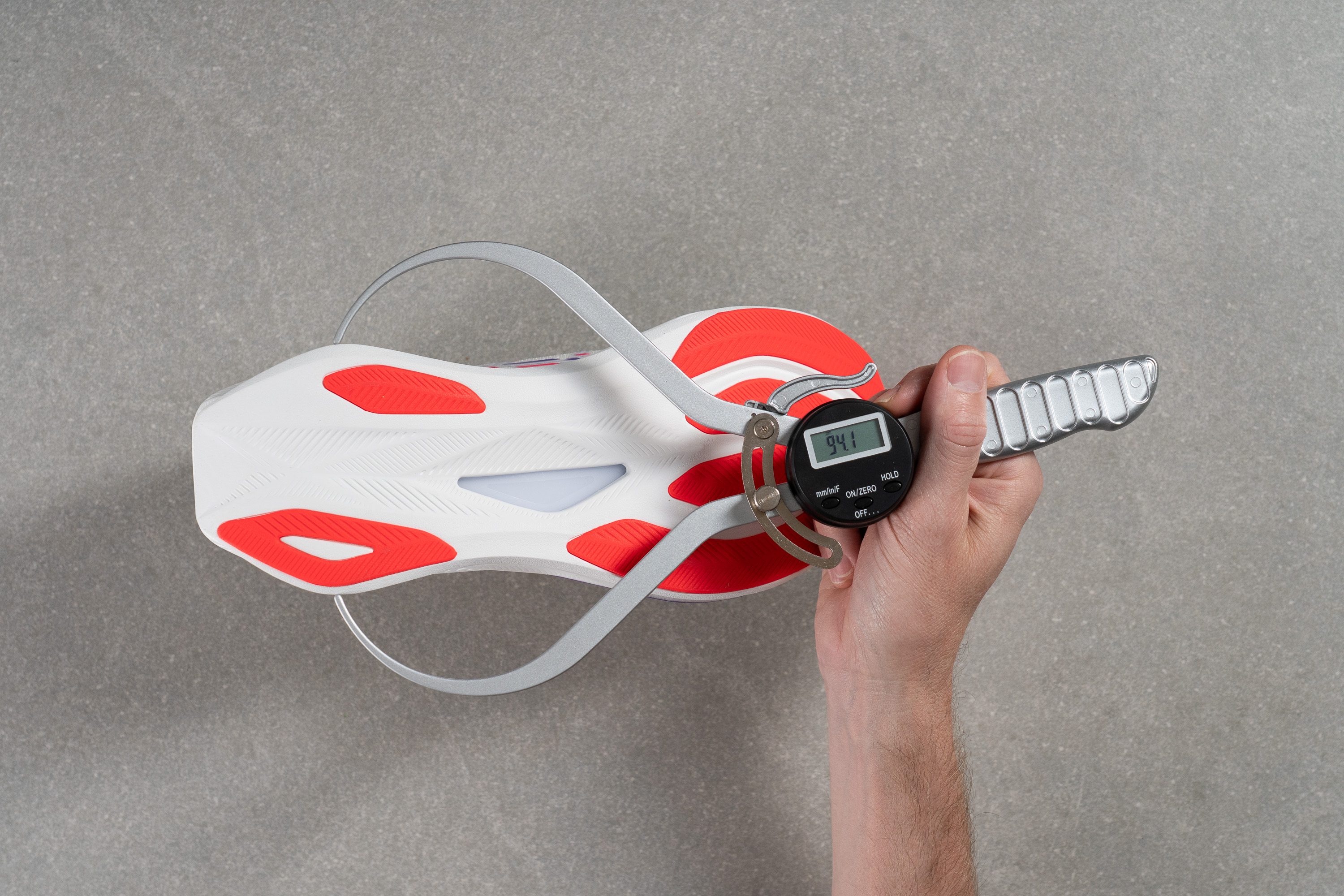
| Sonicblast | 94.1 mm |
| Average | 90.6 mm |
Durability
Toebox durability
The outstanding ventilation we observed in the toebox during our smoke test comes with a clear trade-off: durability.
After testing it with our Dremel tool, it scored just 1/5, the lowest possible result.
| Sonicblast | 1 |
| Average | 2.6 |
Heel padding durability
While the toebox is really fragile and there’s no way to sugarcoat it, the heel padding did the opposite and scored an outstanding 5/5. But hey, if we have to choose, it’s better to have this result than the other way around.
| Sonicblast | 5 |
| Average | 3.4 |
Outsole durability
ASICSGRIP shines in traction but it's not as stellar in durability. Still, the 1.0 mm of wear we measured is a solid result, showing decent resistance to abrasion.
| Sonicblast | 1.0 mm |
| Average | 1.1 mm |
Outsole thickness
We measured 2.0 mm of rubber at the thickest point of the outsole, which feels like a smart balance for a lightweight super trainer, though ASICS trimmed it slightly compared to the Superblast 2.
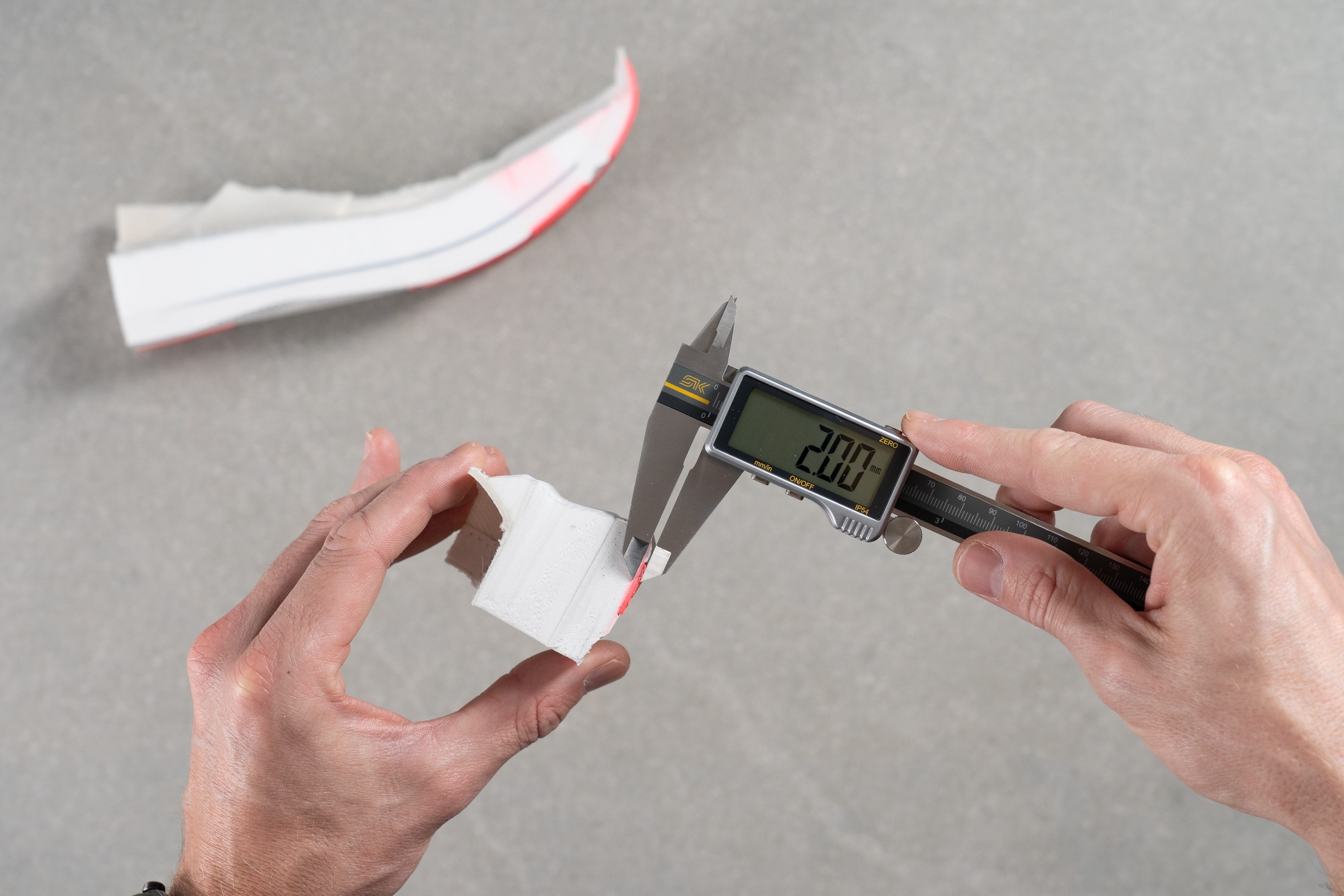
| Sonicblast | 2.0 mm |
| Average | 3.2 mm |
Misc
Insole thickness
The insole measures 4.8 mm in thickness, making it consistent with most ASICS models except for the brand’s super shoes, which typically use thinner insoles.
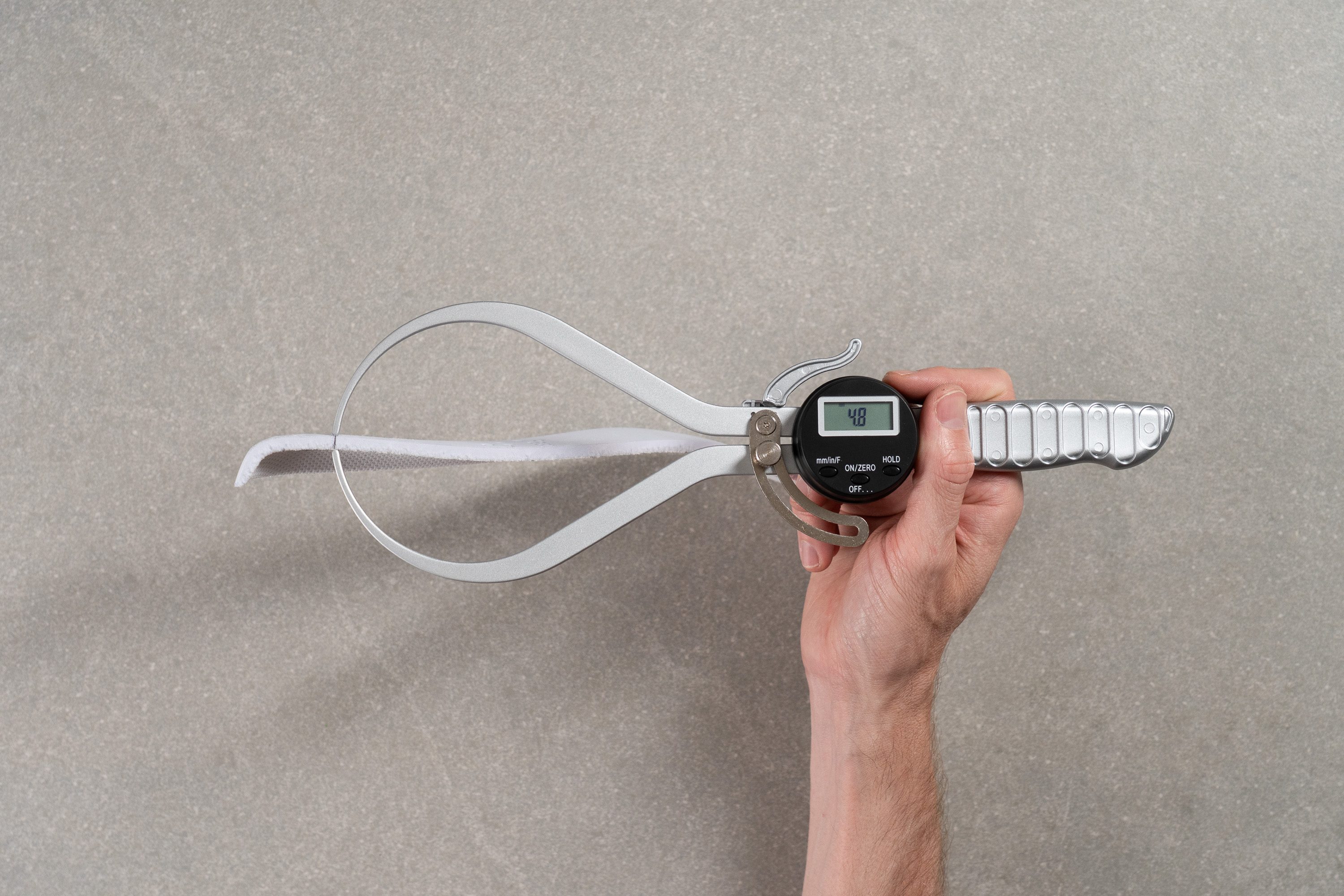
| Sonicblast | 4.8 mm |
| Average | 4.5 mm |
Removable insole
The insole is fully removable since it isn’t glued or attached to the midsole.
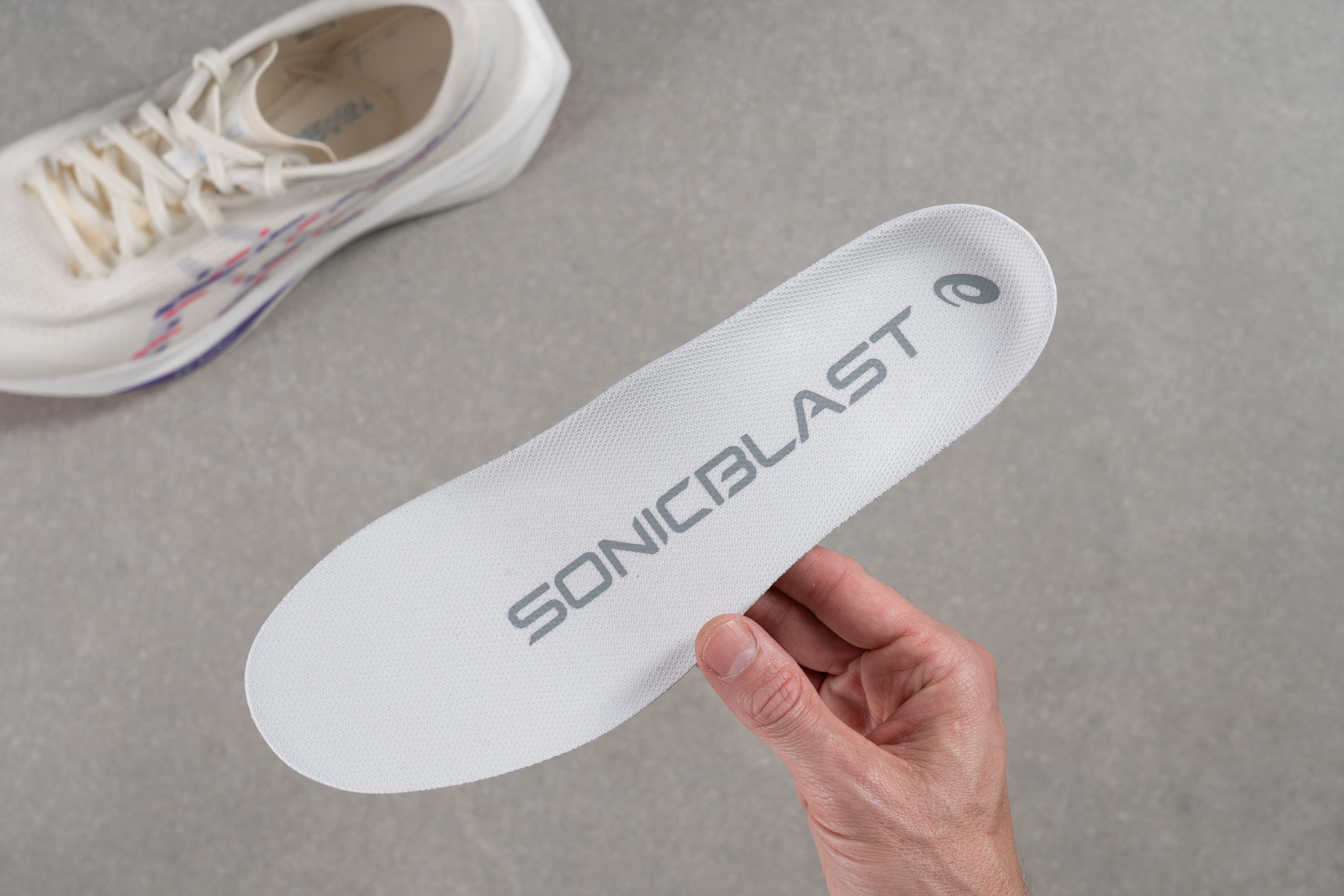
| Sonicblast | Yes |
Midsole softness in cold (%)
Thanks to its A-TPU foam, the Sonicblast maintains its performance in cold conditions. After 20 minutes in the freezer, we measured an impressively low 4% change. It's an excellent result for winter running!
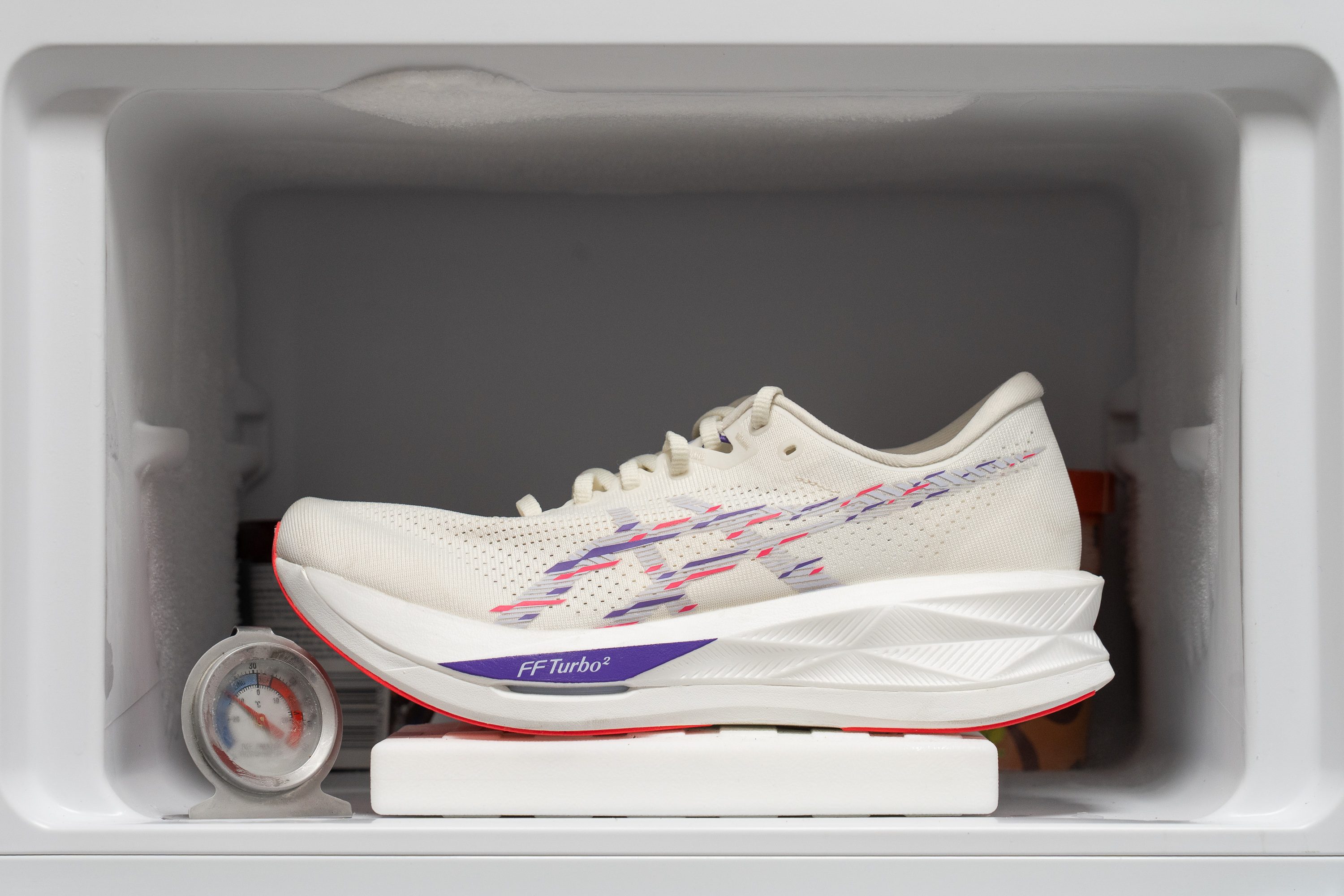
| Sonicblast | 4% |
| Average | 24% |
Reflective elements
We noted that this shoe doesn’t include any reflective elements, and while they don’t affect performance, we always appreciate them for an extra touch of safety.
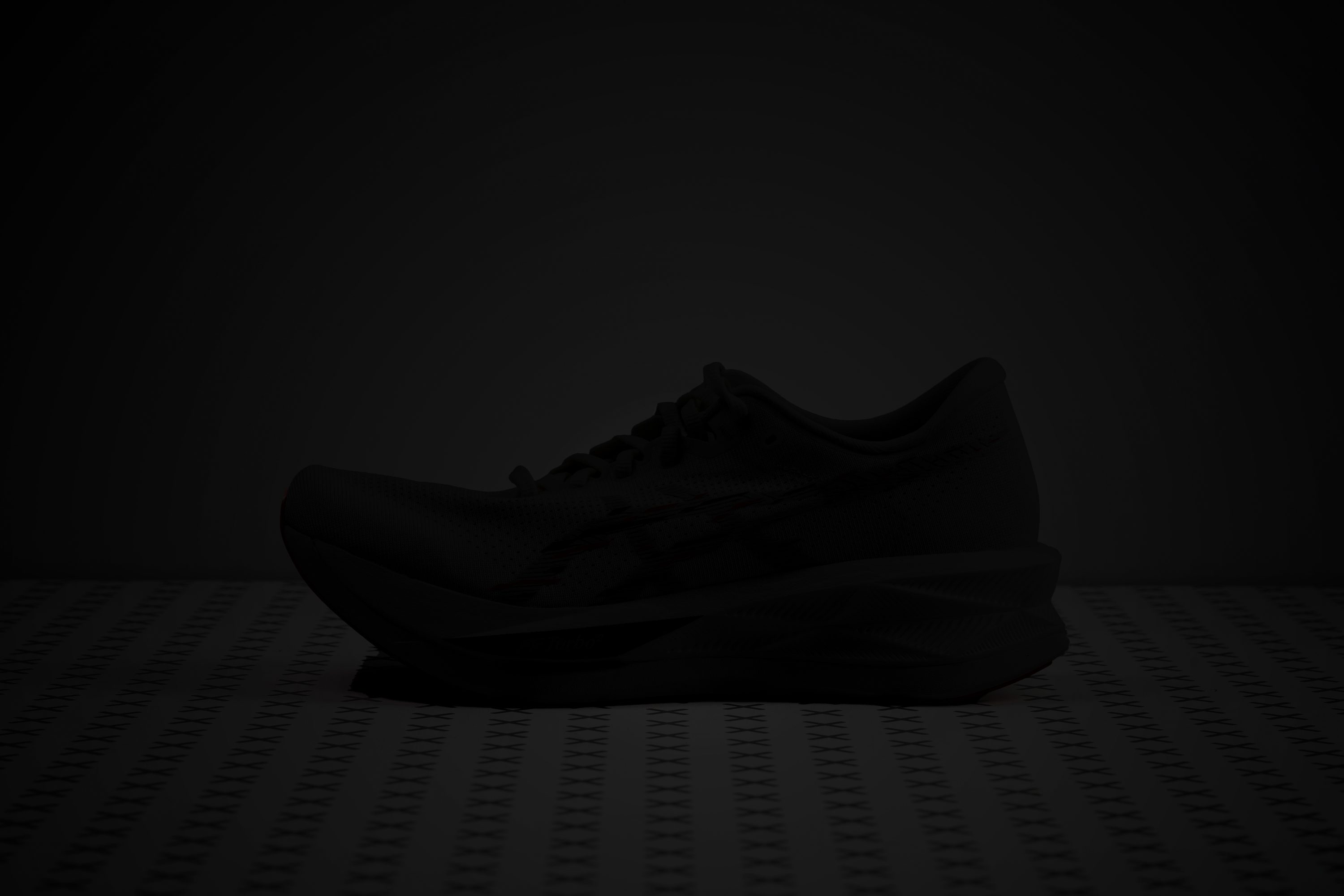
| Sonicblast | No |
Tongue padding
The Sonicblast uses flat laces that run through reinforced punched eyelets, offering a secure and reliable lockdown. However, this is where its lower price also becomes noticeable—there are no textured, high-grip laces here.
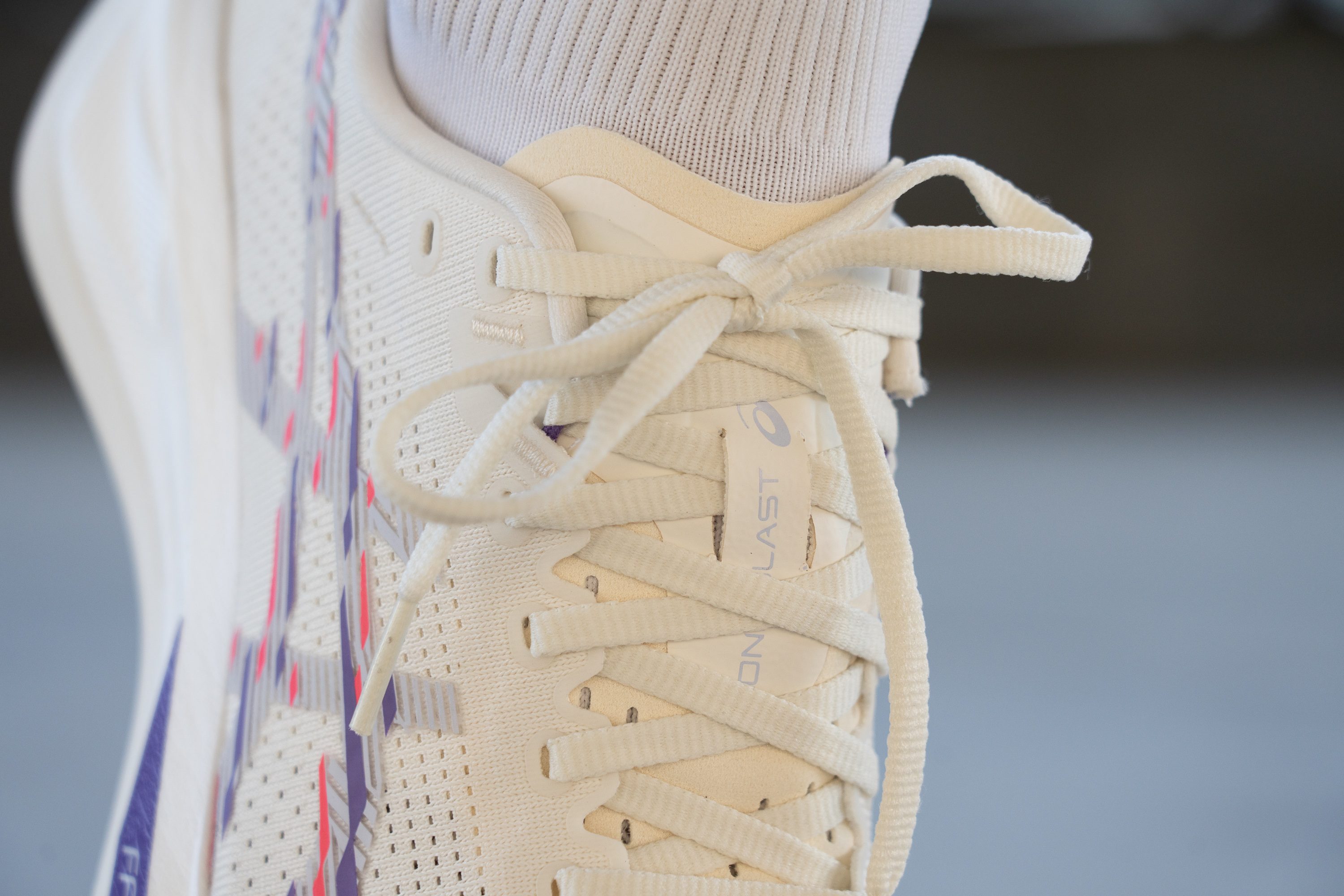
We found the tongue consistent with recent ASICS designs, featuring minimal padding and a real thickness of just 0.8 mm. This requires a bit more care when tightening the laces, but it helps save weight.
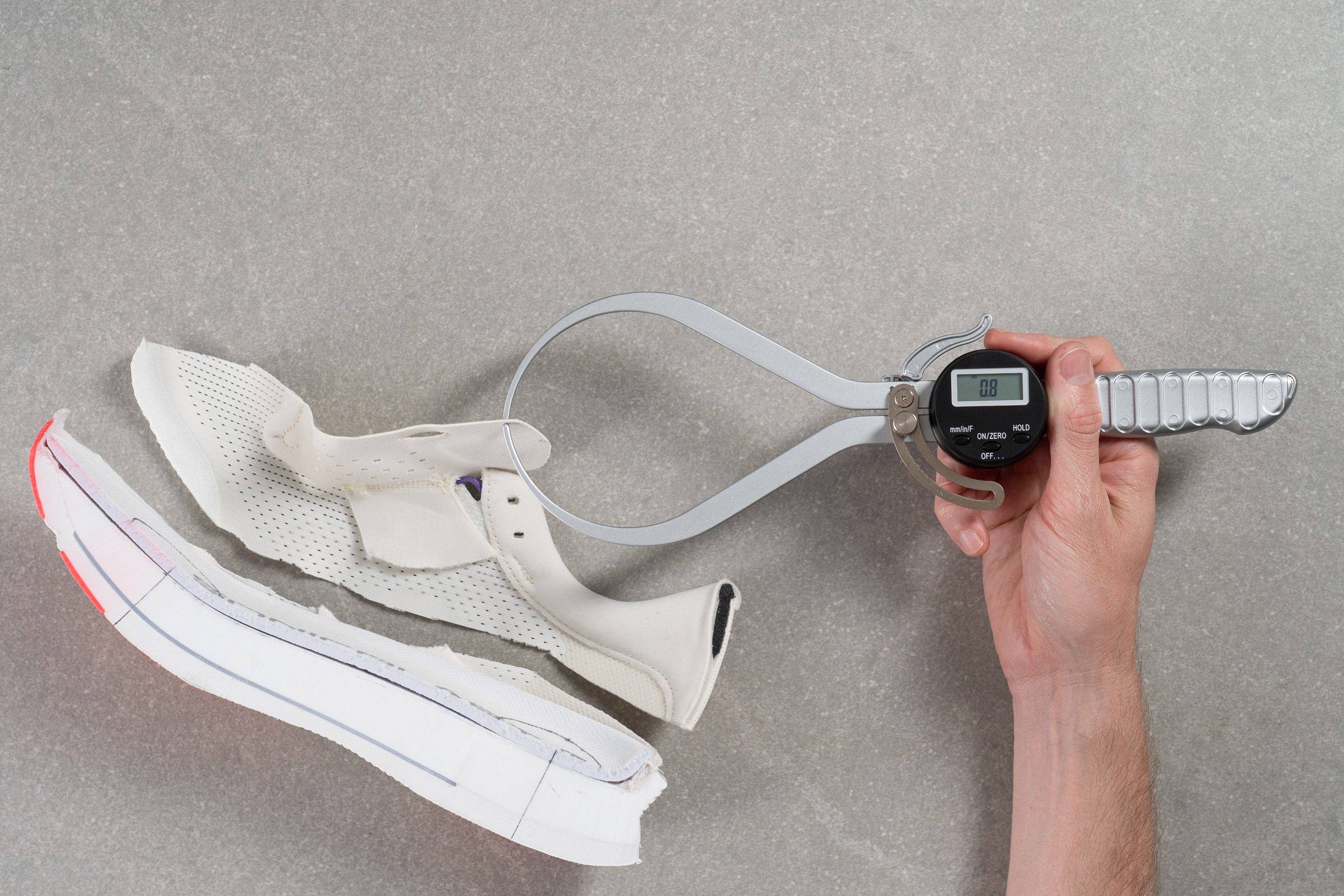
| Sonicblast | 0.8 mm |
| Average | 5.7 mm |
Tongue: gusset type
The tongue is nicely executed, being fully attached to the midsole to prevent any unwanted movement during runs. This detail isn’t guaranteed in all super trainers—for example, the pricier HOKA Mach X 3 features a loose, free-floating tongue instead.
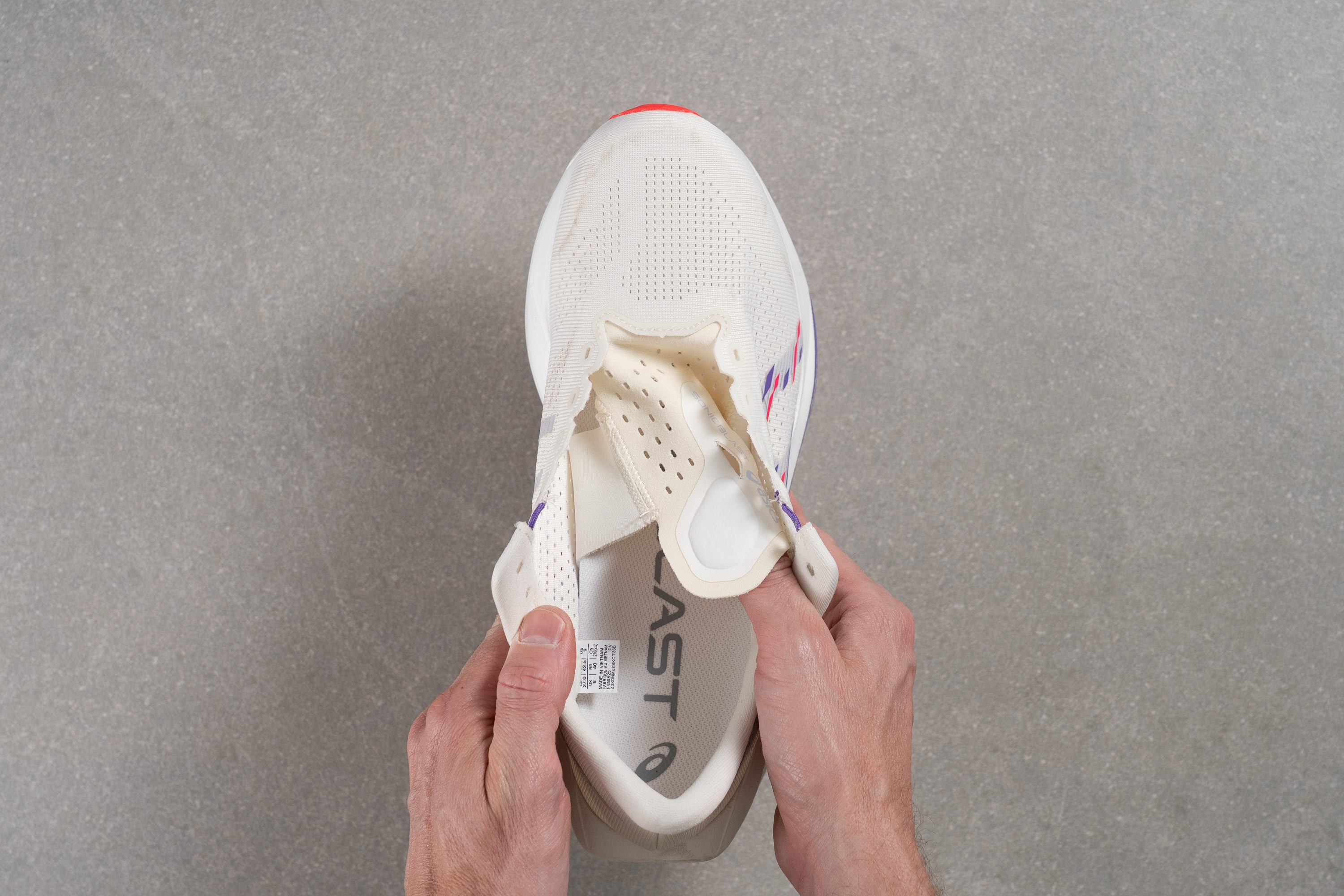
| Sonicblast | Both sides (semi) |
Heel tab
The Sonicblast skips a heel tab for a clean look, prioritising lightweight simplicity and offering a look very similar to the Metaspeed series.
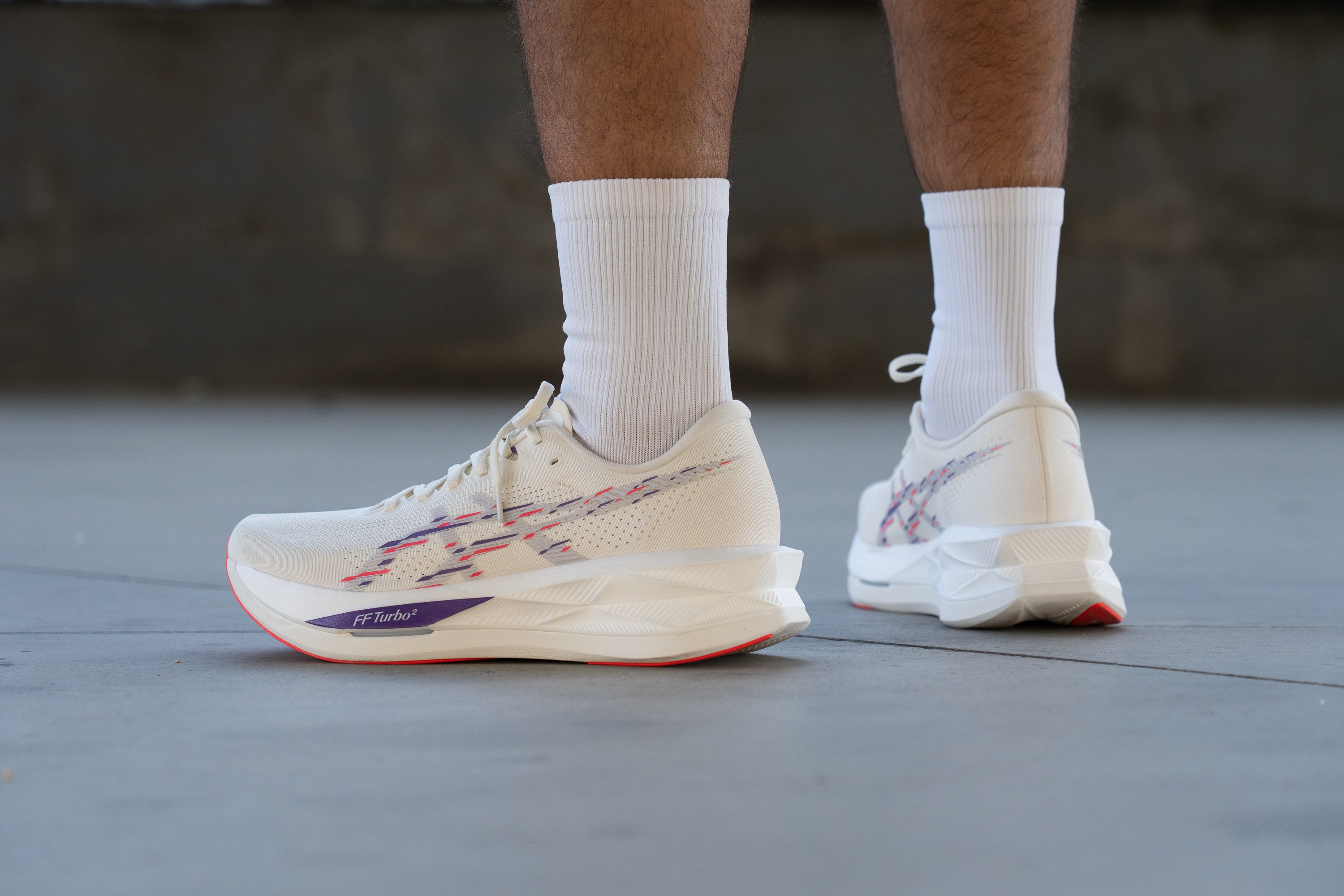
| Sonicblast | None |
Price
Since the Novablast debuted in 2020, ASICS has been building on its huge success. Five years later, the brand is going full speed with the Blast lineup. It now features 4 models at 4 different price levels: Novablast, Sonicblast, Superblast, and Megablast.
Each step up brings a higher price and enhanced performance, placing the Sonicblast right in the middle of ASICS’ most popular range.
| Sonicblast | $180 |

